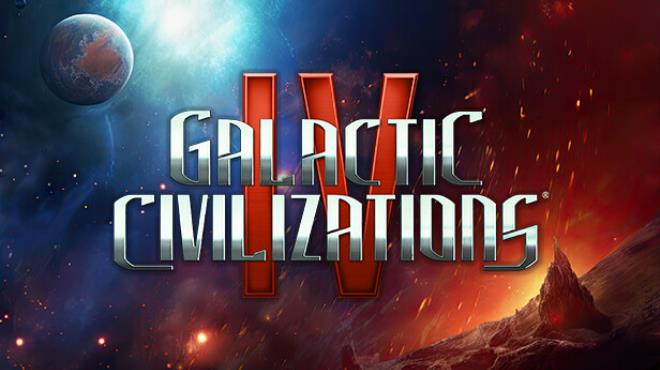Hello and welcome to Galactic Civilizations IV. If you’re here, you might want more detailed information than what’s in the game’s tutorial. في هذا الدليل, we’ll walk through a regular game, specifically the initial 10 turns. Our goal is to assist you in making the most of this incredible and complex space strategy game.
الآن, let’s dive into the first 10 turns of Galactic Civilizations IV, which is designed to aid new players in understanding and enjoying this fantastic space strategy game.
New Game
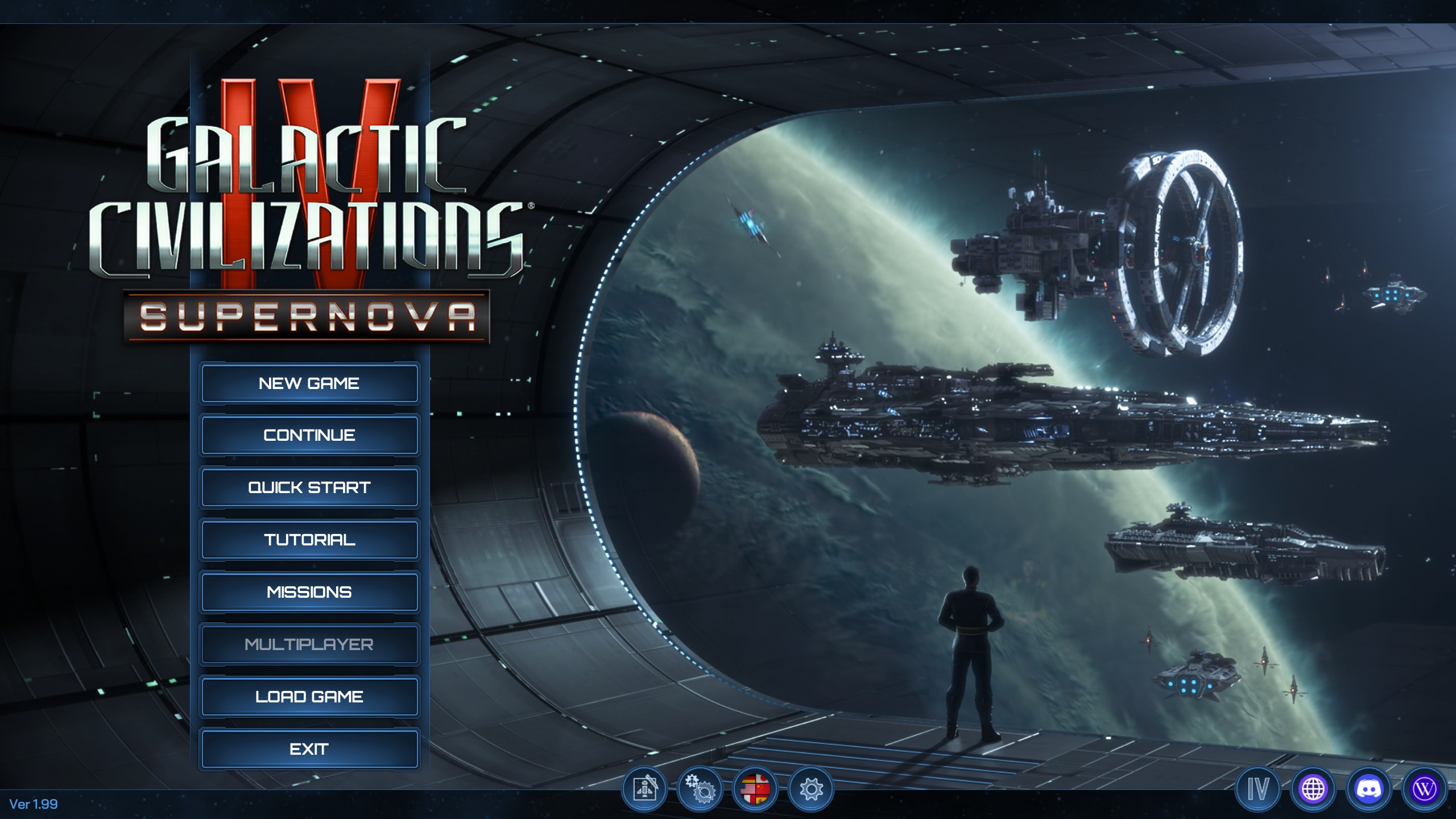
Let’s start a new game. للقيام بذلك, click on “New Game.”
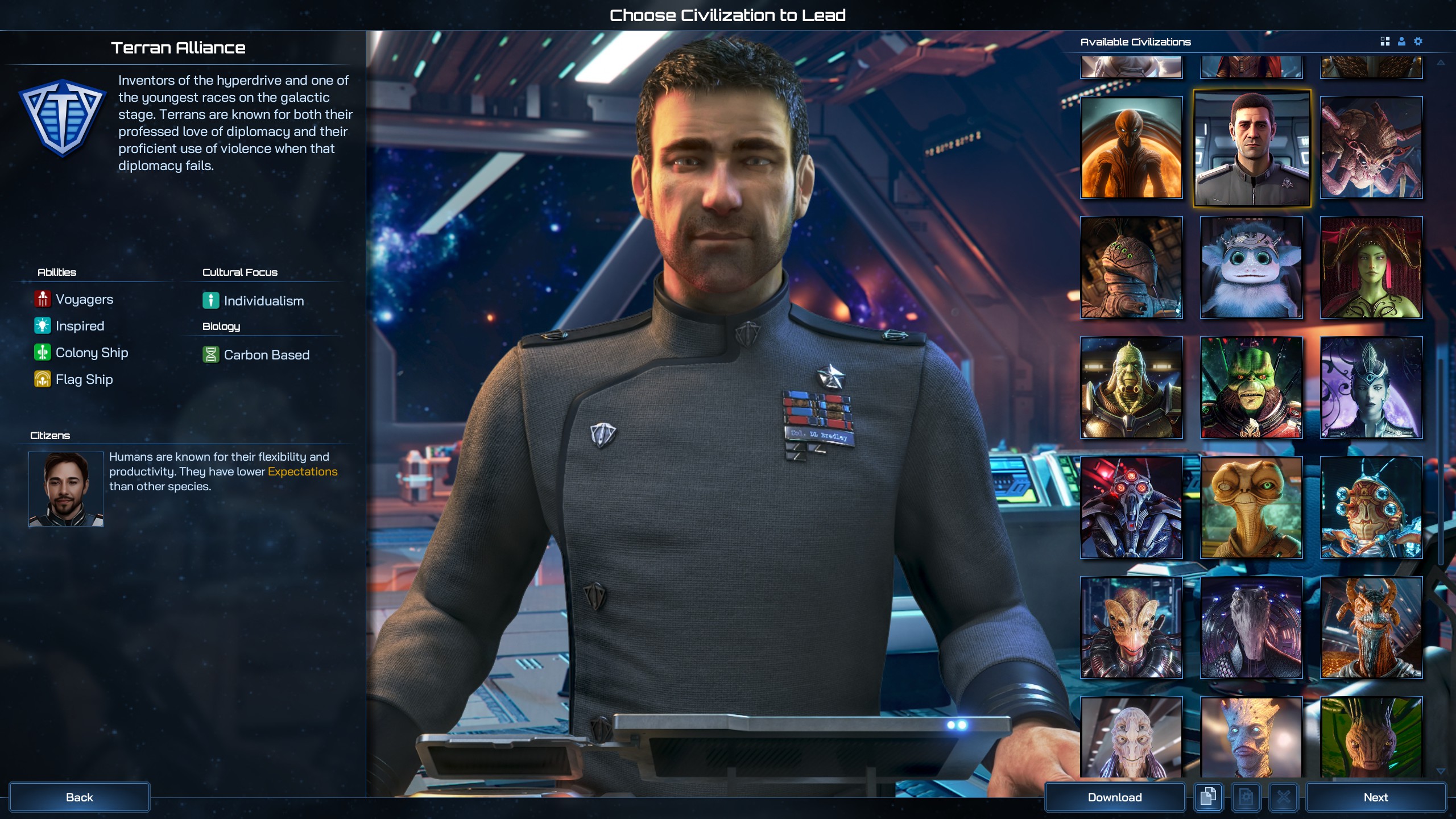
الآن, for our beginner’s playthrough, we’ll keep things simple. Choose to play as the Terran Alliance, which represents the humans of Earth. They’re a pretty standard bunch of bipedal hairless apes from Sol III, Earth. They’re considered the “easy” civilization in the game.
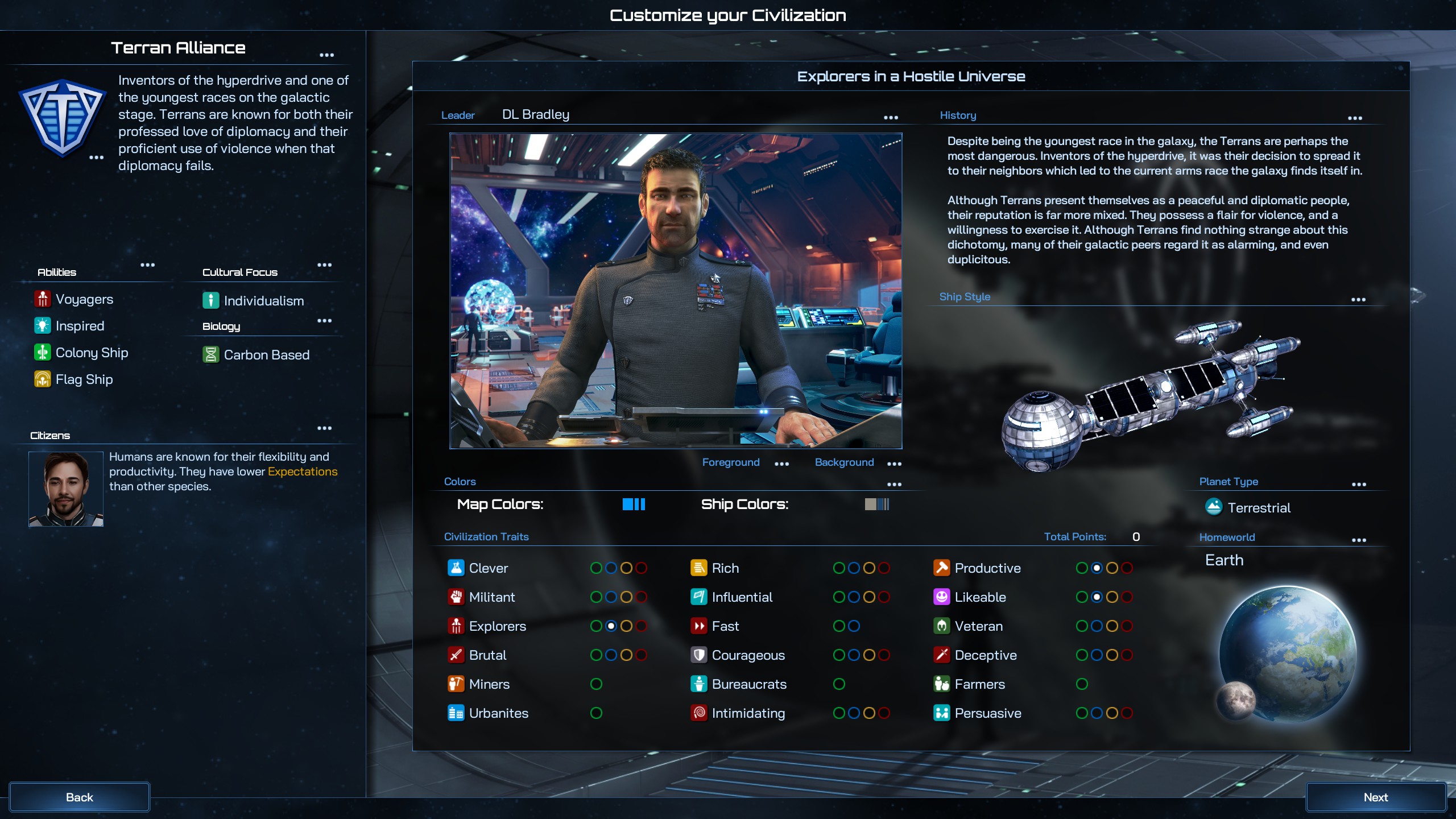
You can stick with the default settings for the Terran Alliance; they’re neither exceptionally great nor terrible.
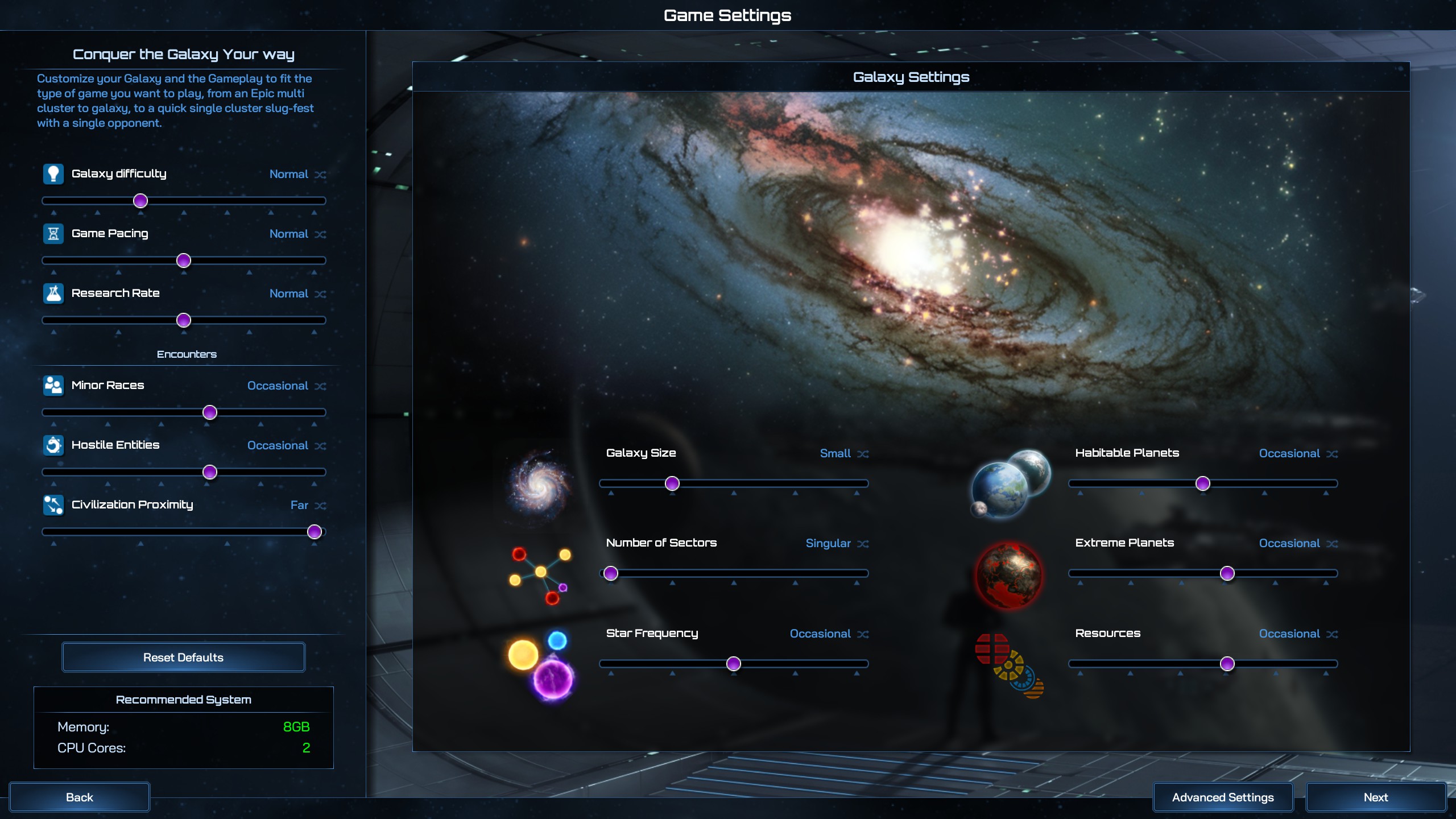
When it comes to the map setup, maintain all the default settings, but adjust the number of sectors to just one. This will keep things as straightforward as possible.
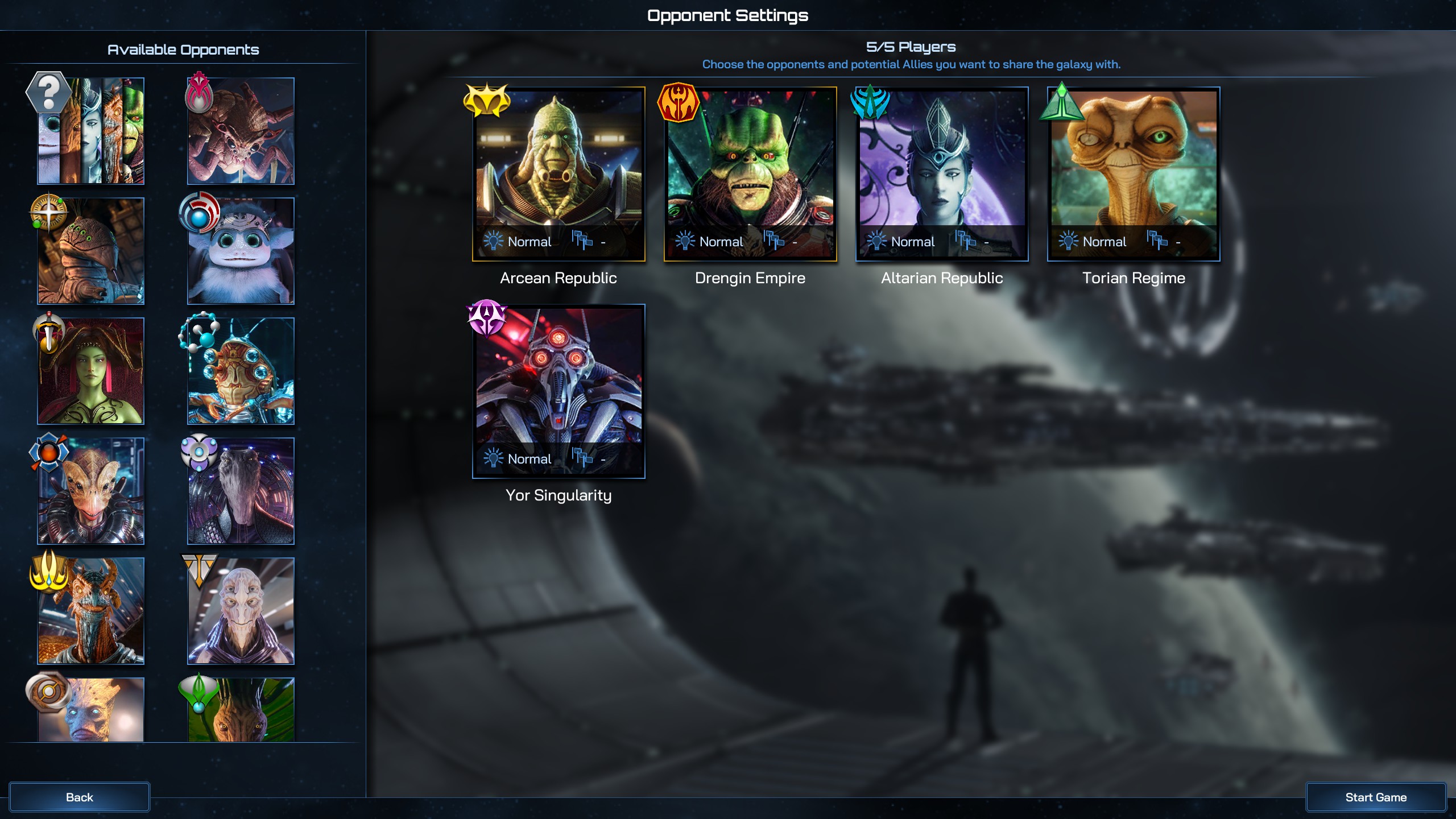
As for your opponents, it’s not crucial for our beginner’s game, but it can significantly impact your experience. You can face peaceful, nature-loving space alien beings for a more tranquil game or choose fierce and aggressive opponents for constant warfare. يتذكر, a hero, which is you, is only as exciting as their adversaries.
دور 1
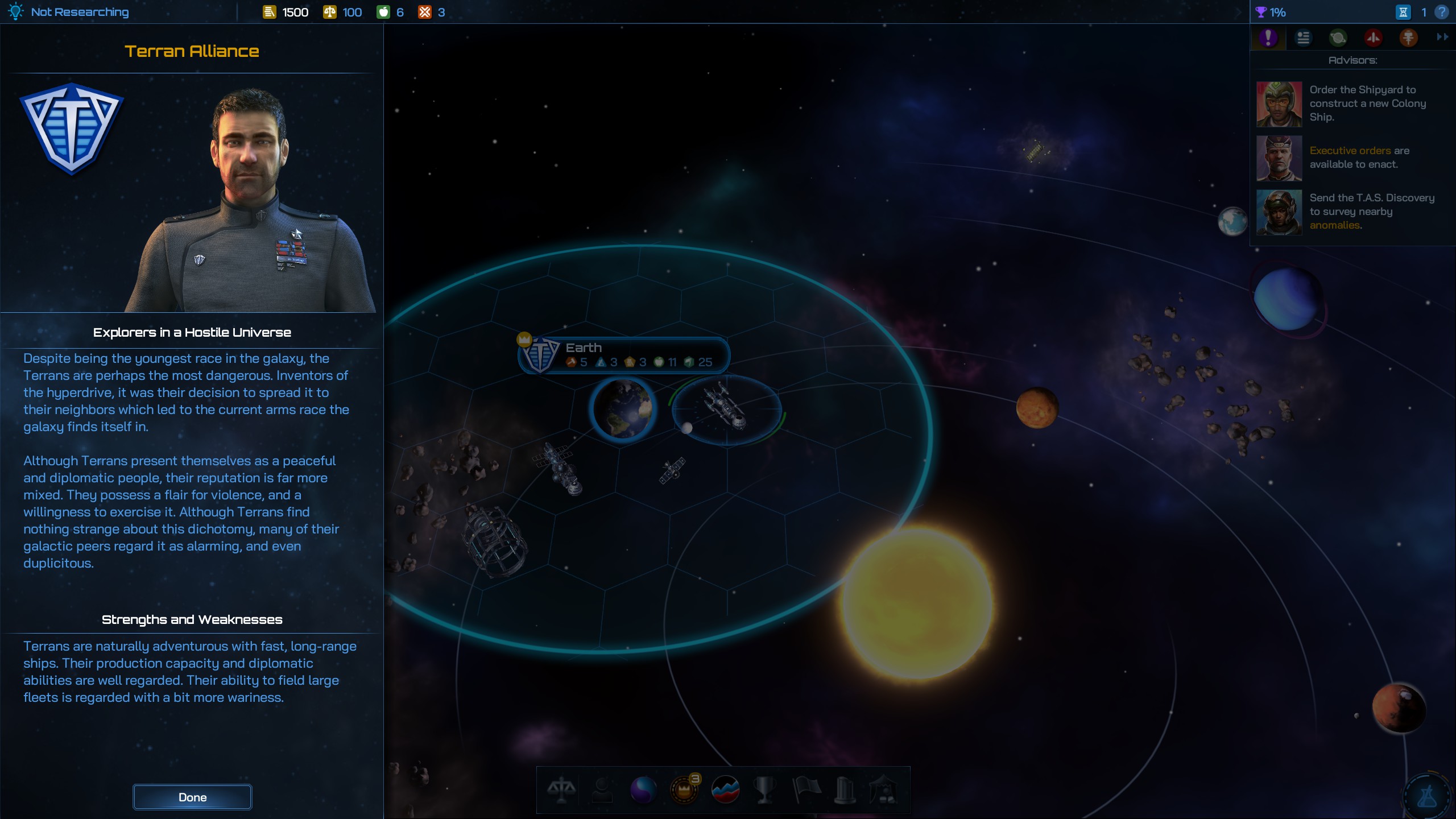
Let’s kick off with the first turn in the game. Once you’re inside the game, you’ll be greeted with a lot of information, but we’ll keep it simple.
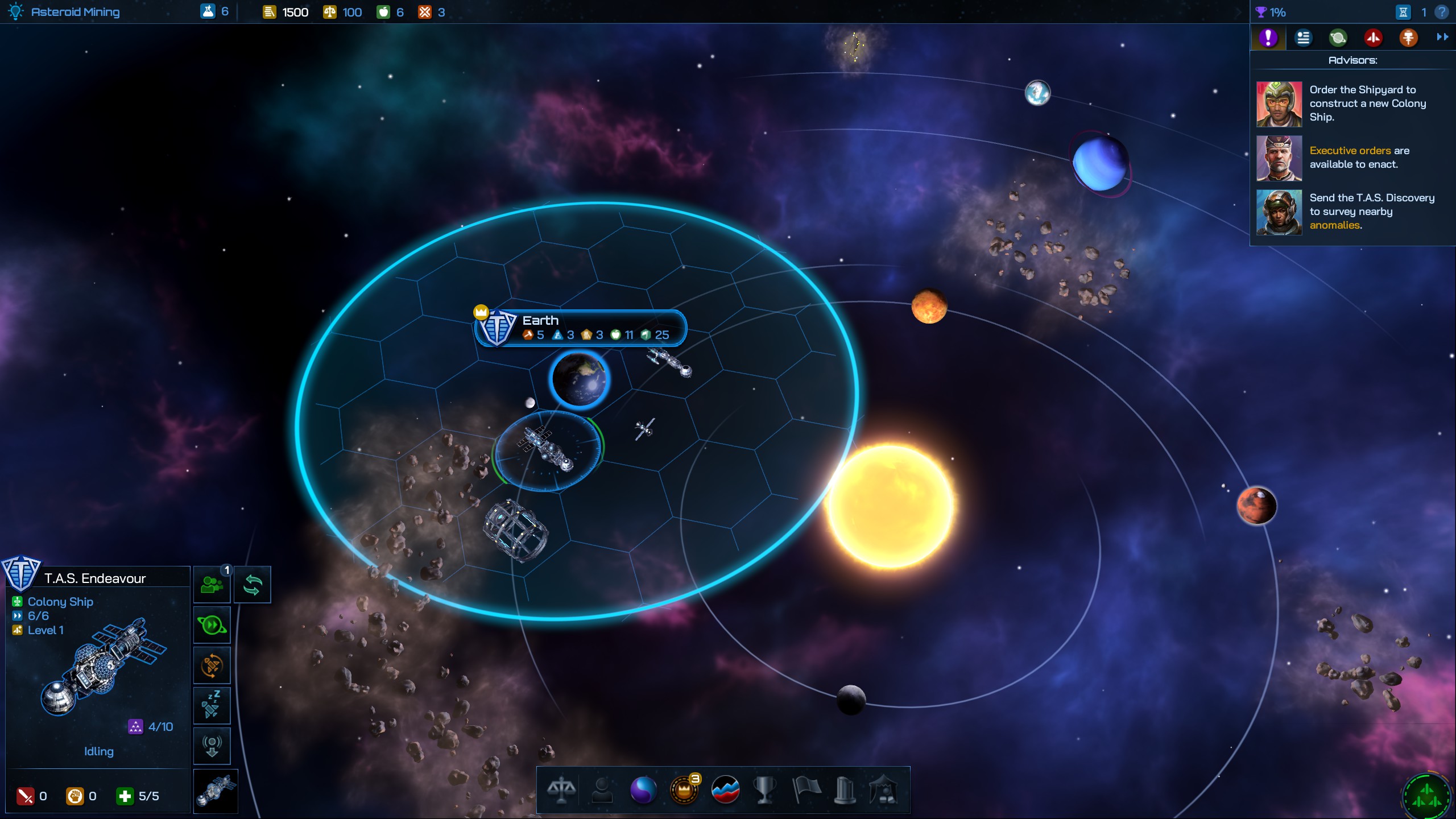
أولاً, let’s talk about your ships. You can select a ship by LEFT-clicking on it. If you want more information about a ship, just DOUBLE LEFT-CLICK on it. (Double clicking is like using a magic spell to learn more.)
To send a ship to a specific place, simply RIGHT-click on the destination you desire.
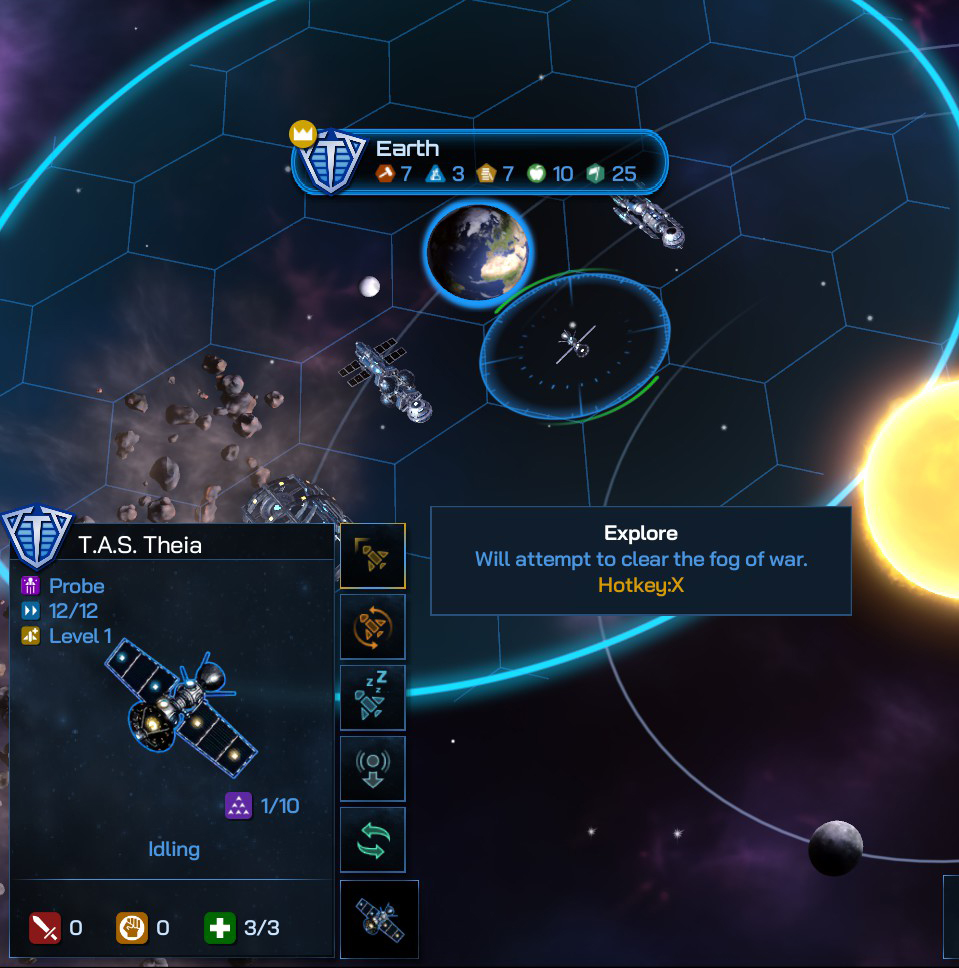
الآن, your probe has unlimited range, and you can set it to auto-explore. It’ll discover new things for you.
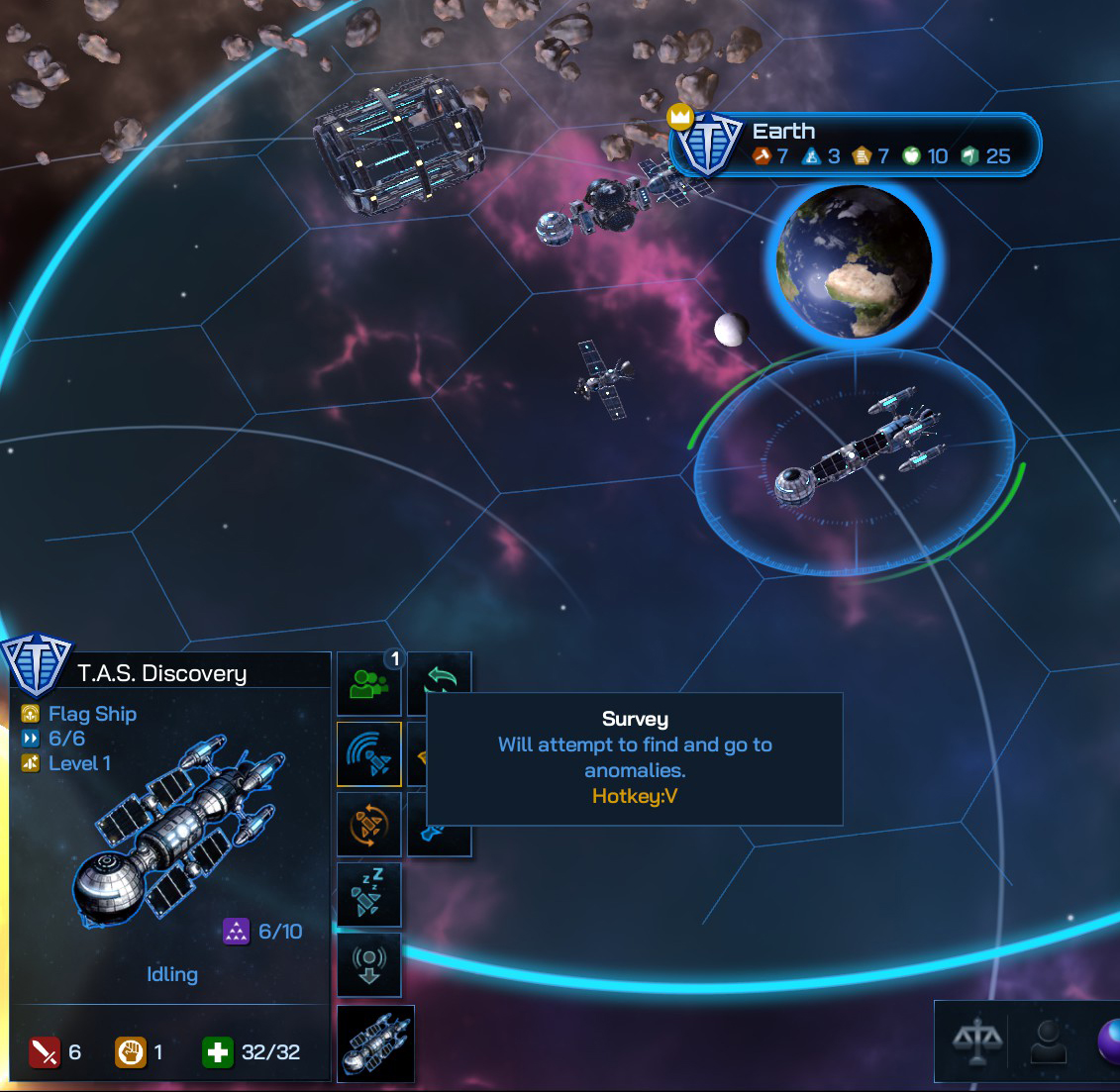
The ship you see here is your flagship. It’s typically called a Survey Ship or Science Vessel and was first introduced in Galactic Civilizations I back in 2003. These ships venture out to explore mysterious new phenomena. ضع في اعتبارك, in Galactic Civilizations IV, you can’t build as many of these as you like because anomalies are now more potent. لكن, you’ll get more of them through technology and other means, more than you can imagine.
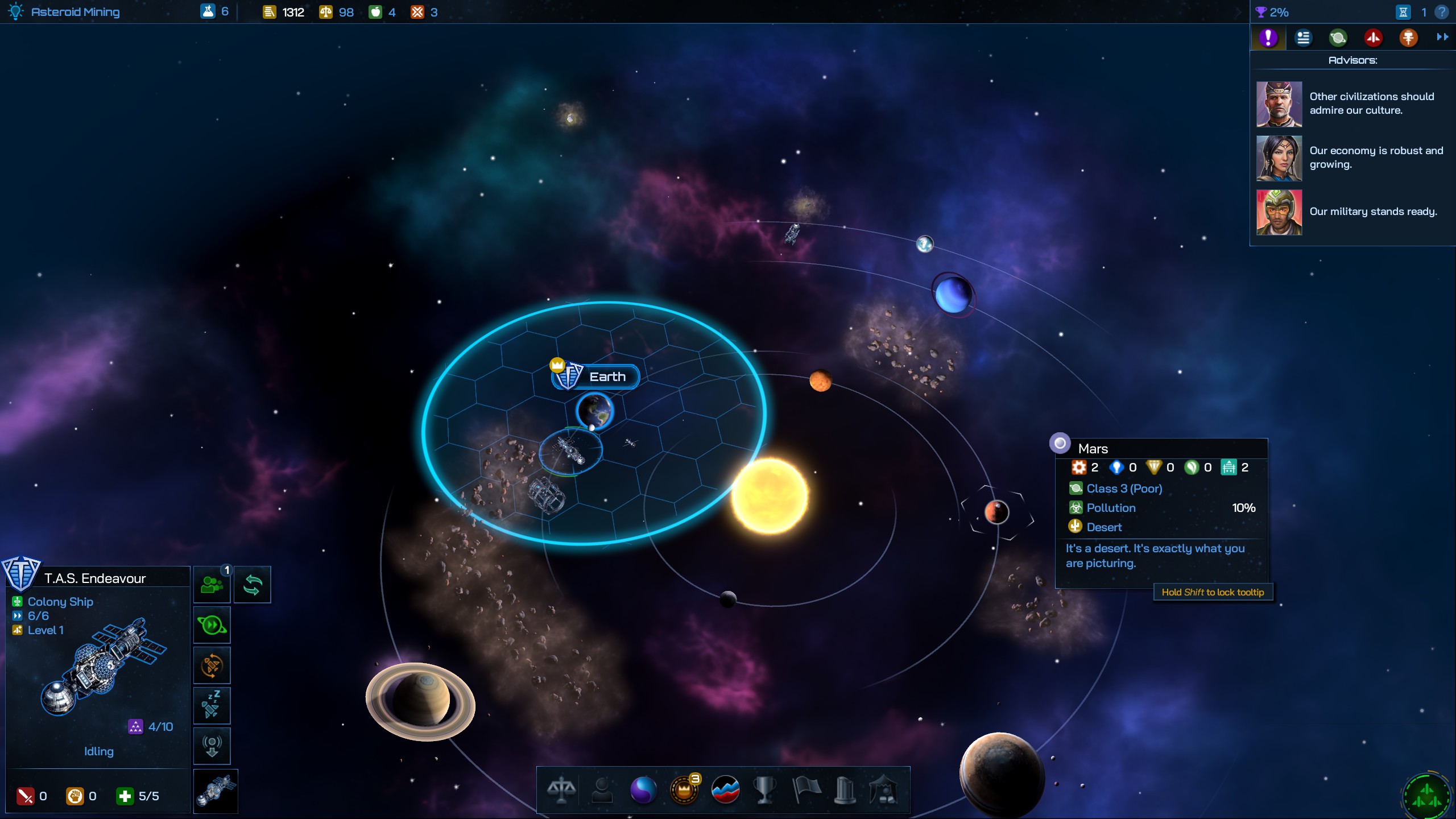
You’ll notice Mars nearby. It might not be the greatest planet, but it’s close. I recommend sending your colony ship there.
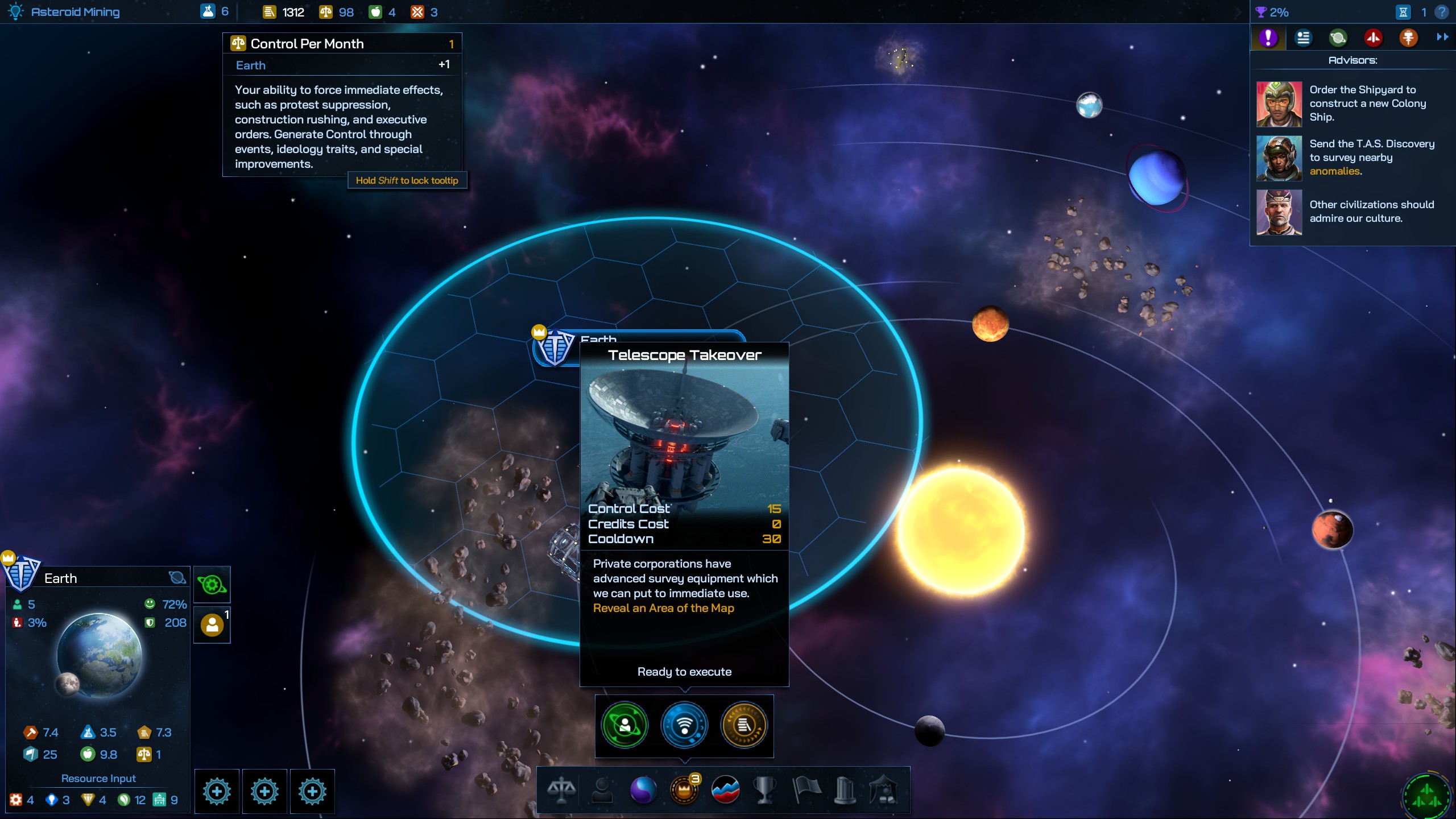
You’ll also notice these things called Executive Orders. Each turn, you generate control points, and you can use these orders to do something instantly in the world.
The Planet Screen
The Planet Screen might seem a bit complex, and if we were smarter (which we’re not), we might have used tabs to simplify it. لكن, once you get the hang of it, you’ll see why we’ve kept everything in one place for your convenience.
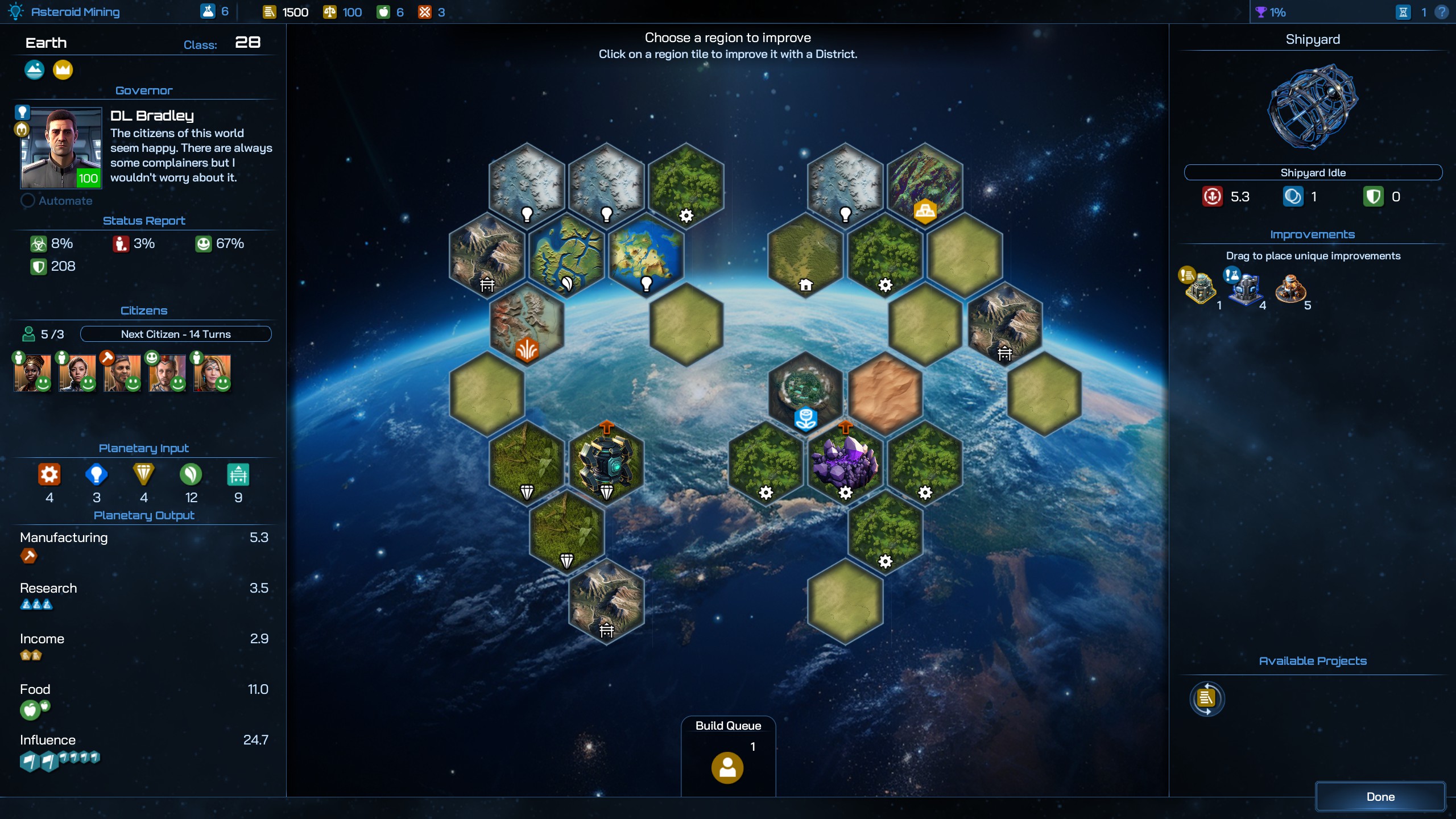
The shape of the continental landmasses is vaguely represented as hex regions, except for Australia (they didn’t send enough bribes to get included).
Planets have different inputs, and these inputs are utilized by the planet’s citizens. These citizens, empowered by the planetary improvements you build, convert these inputs into outputs that your civilization can use.
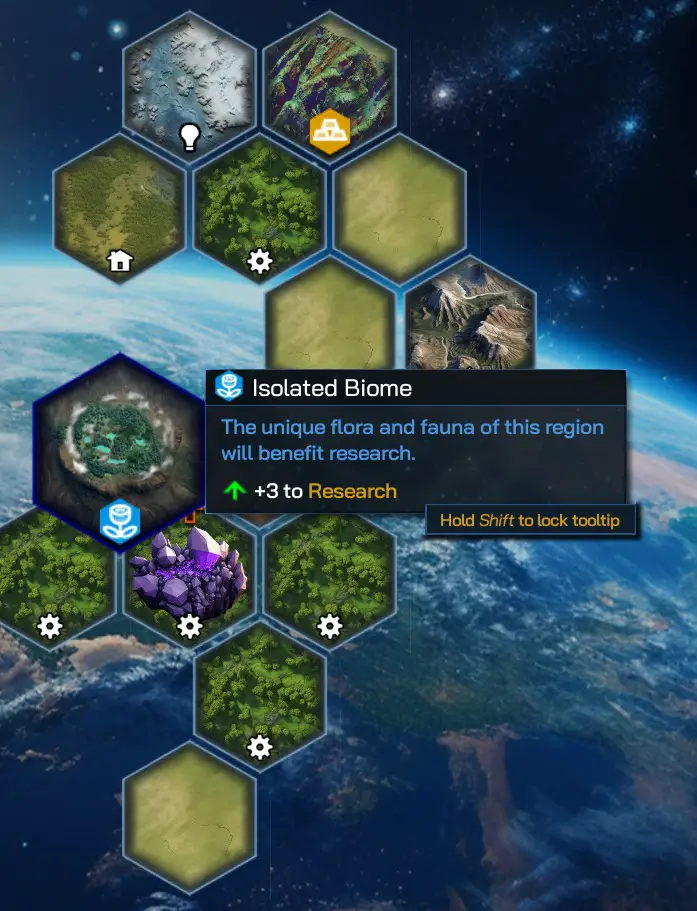
Some regions on the planet have special bonuses. If you place something of the same type on a region with a bonus, it levels up, enhancing its performance.
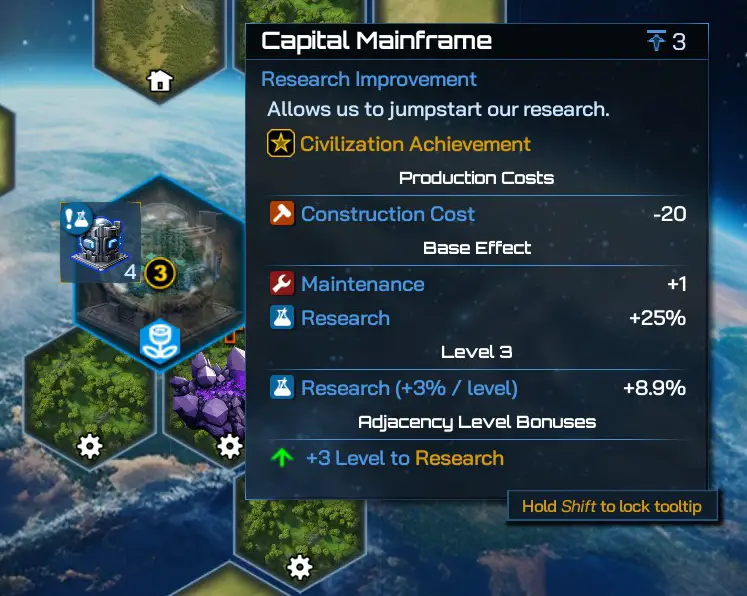
على سبيل المثال, if you drag a Research improvement onto a tile with a +3 research modifier, you’ll see the 3 appear just before you place it. Going up 3 levels in this example results in nearly a 9% increase in research on your planet. بالإضافة إلى ذلك, this structure provides adjacent tiles with a +3 research level if you place a similar improvement or build a district of the same kind.
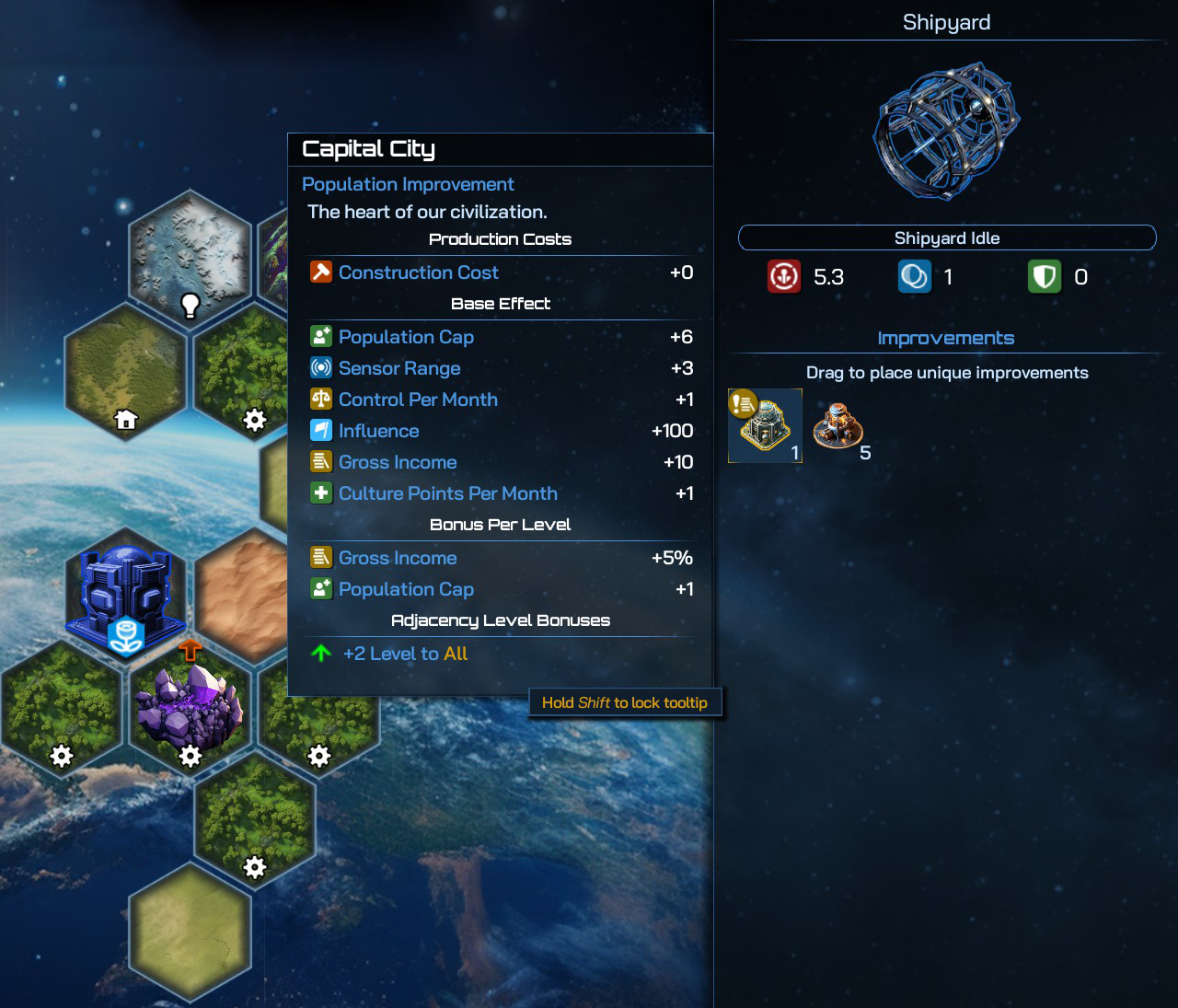
Don’t forget to place your capital city. The capital city and later colonial capitals are cost-free and appear instantly, so there’s no need to wait—unless you’re playing as a Ravenous species, as they don’t enjoy this benefit.
Planet Stats
الآن, let’s take a look at the planet stats. These are essential for managing your planets effectively.
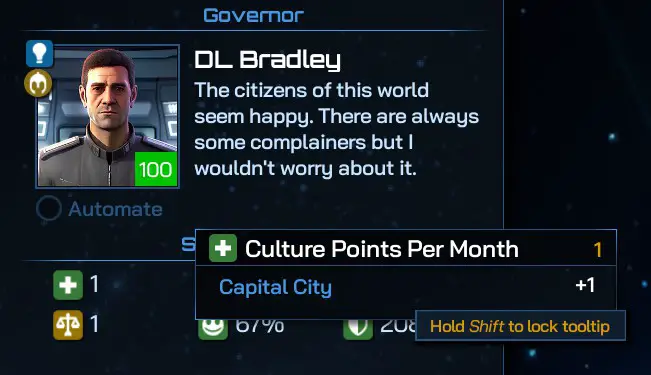
- Culture Points: Every turn, your capital city generates a culture point. These points are used for cultural progression later in the game. عادة, only your home world generates these points (except for Festron).
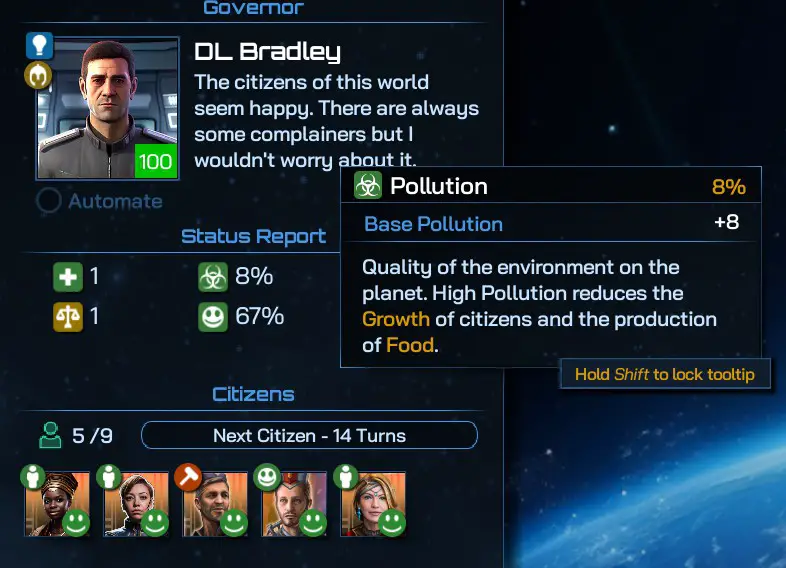
- Pollution: Pollution can reduce the food output of the planet. You need food for your population to grow, so it’s vital to manage pollution effectively.
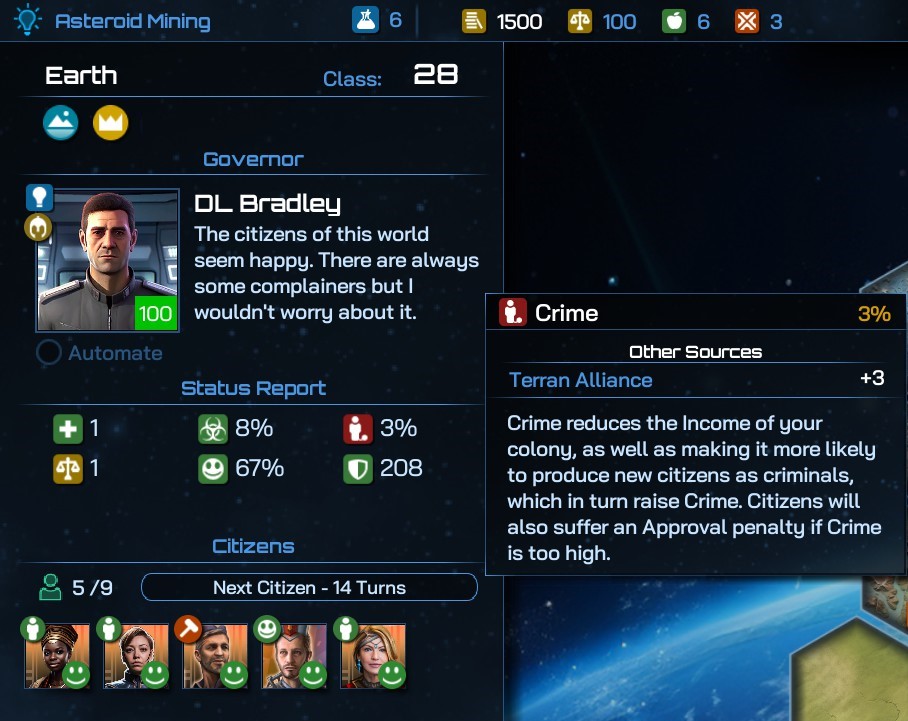
- Crime: Crime on your planet can stem from various sources. أحيانا, you might have actual criminals as citizens, and if that’s the case, you can either incarcerate them or, humorously, send them to Australia or a colony.
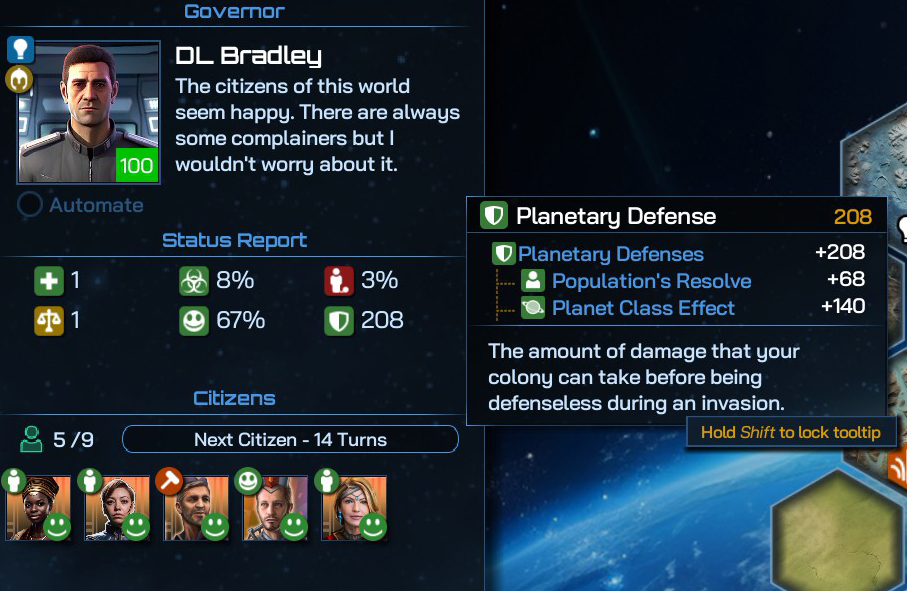
- Planetary Defense: This stat represents how long it would take for an enemy to conquer your planet if they lay siege to it. Enemy fleets have a conquest rating that determines how much of your planetary defense they’ll destroy each turn. When it reaches 0, the planet is conquered.
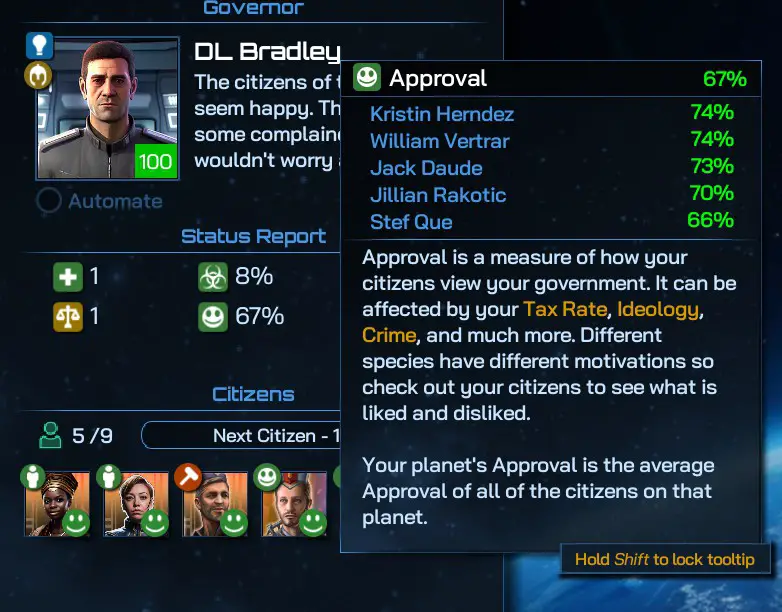
- Approval: Approval is extremely important. It determines how efficient your population is at working. Happy workers are productive workers, which is why it’s a good idea to replace them with machines as soon as you can…
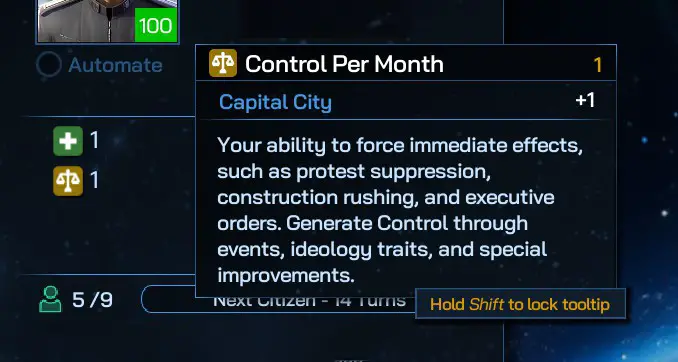
- يتحكم: Control is what allows you to use those Executive Orders effectively. It’s a valuable resource for taking immediate actions in the game.
Citizens
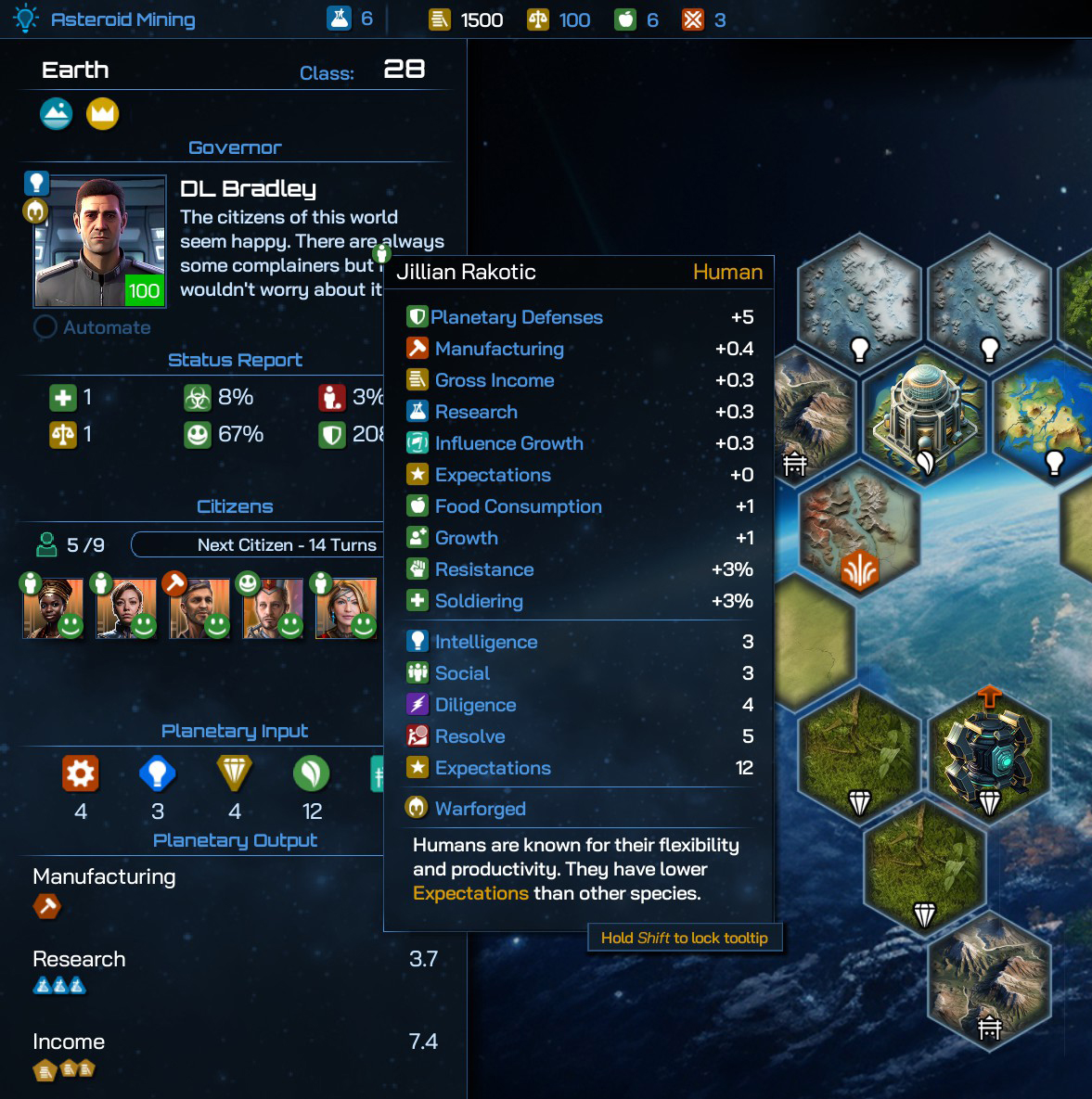
Citizens are the lifeblood of a thriving planet. They take inputs like minerals and technology and transform them into valuable resources for your civilization. Your citizens have four stats that determine how effectively they perform these tasks. Different species possess various strengths and weaknesses, but humans are quite average and decent at everything.
أحيانا, citizens may have traits that affect their performance. على سبيل المثال, “Warforged” indicates their affiliation with a faction, which are essentially like political parties, but we decided to call them factions for various reasons.
<imgsrc=”https://www.gamenguides.com/wp-content/uploads/2023/10/20231018115858_1.jpg”/>
You have the option to spend control to train citizens in a specific profession. This training can boost their proficiency in a particular area but may come at the cost of them not performing as well in another area.
الكواكب: Getting them going
Here’s a valuable tip: Start your production as early as possible.
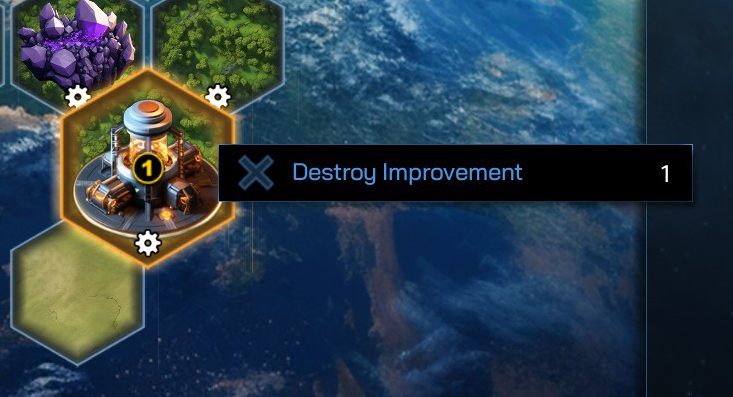
Production buildings are usually brown in color. Place them on tiles that will boost their efficiency (don’t demolish other improvements like this screenshot suggests).
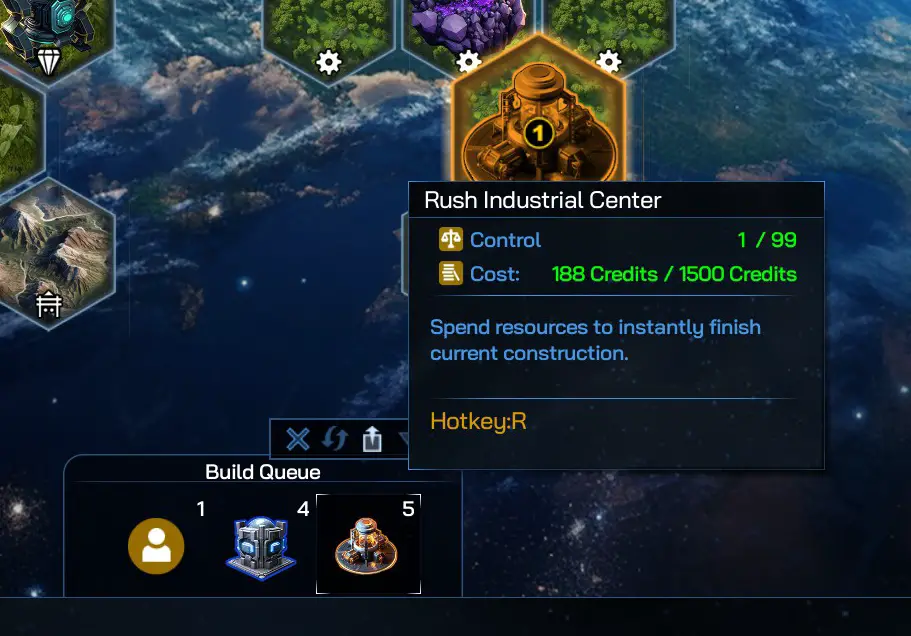
ثم, invest money to rush build these production buildings.
الكواكب: Districts
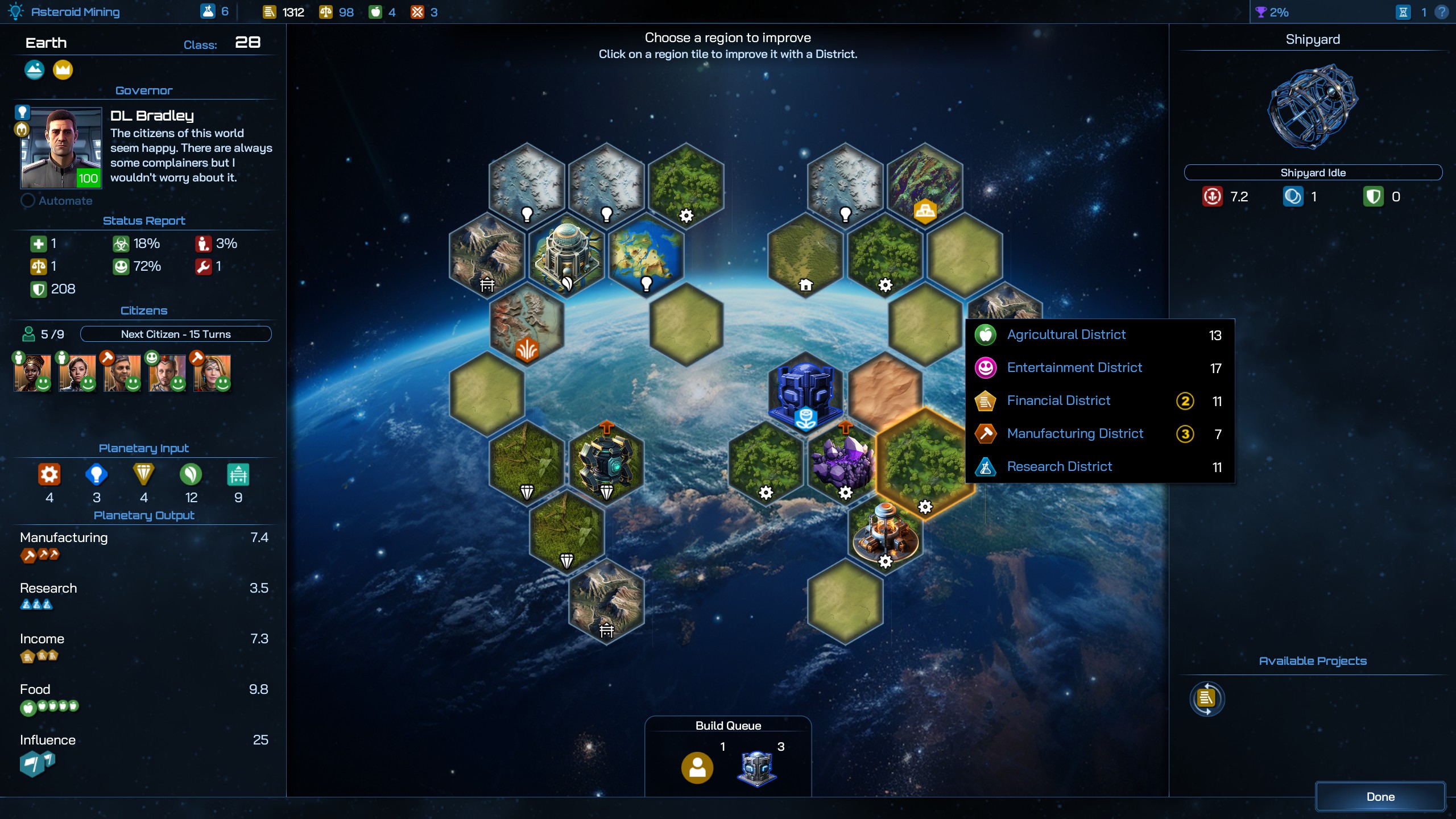
Regarding planets, remember to pay attention to districts. These often overlooked structures are your core infrastructure. They are repeatable improvements that you can place wherever you like.
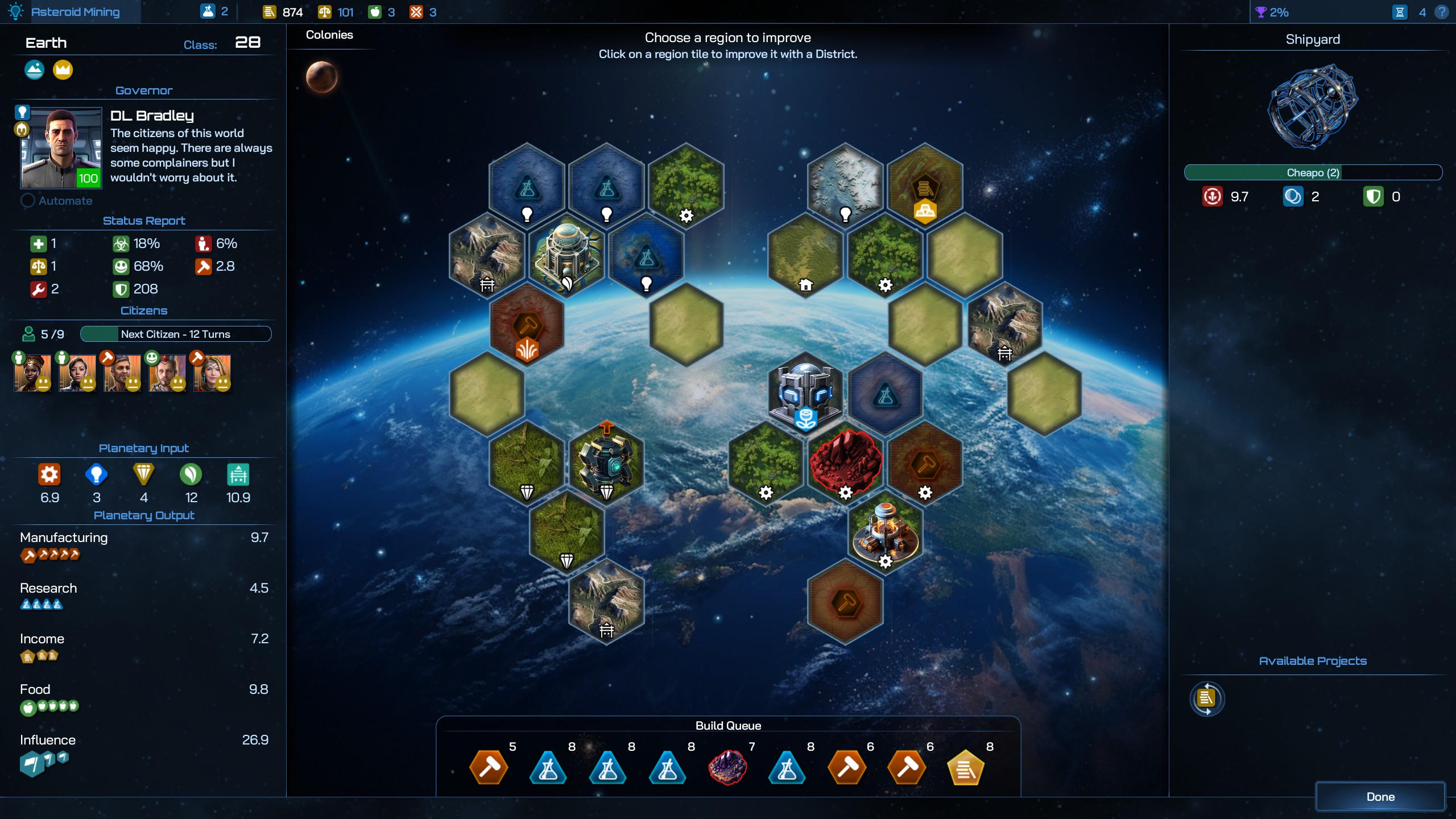
في الحقيقة, skilled and, might I say, exceptionally good-looking players will queue up a multitude of districts for maximum efficiency.
Making Starships
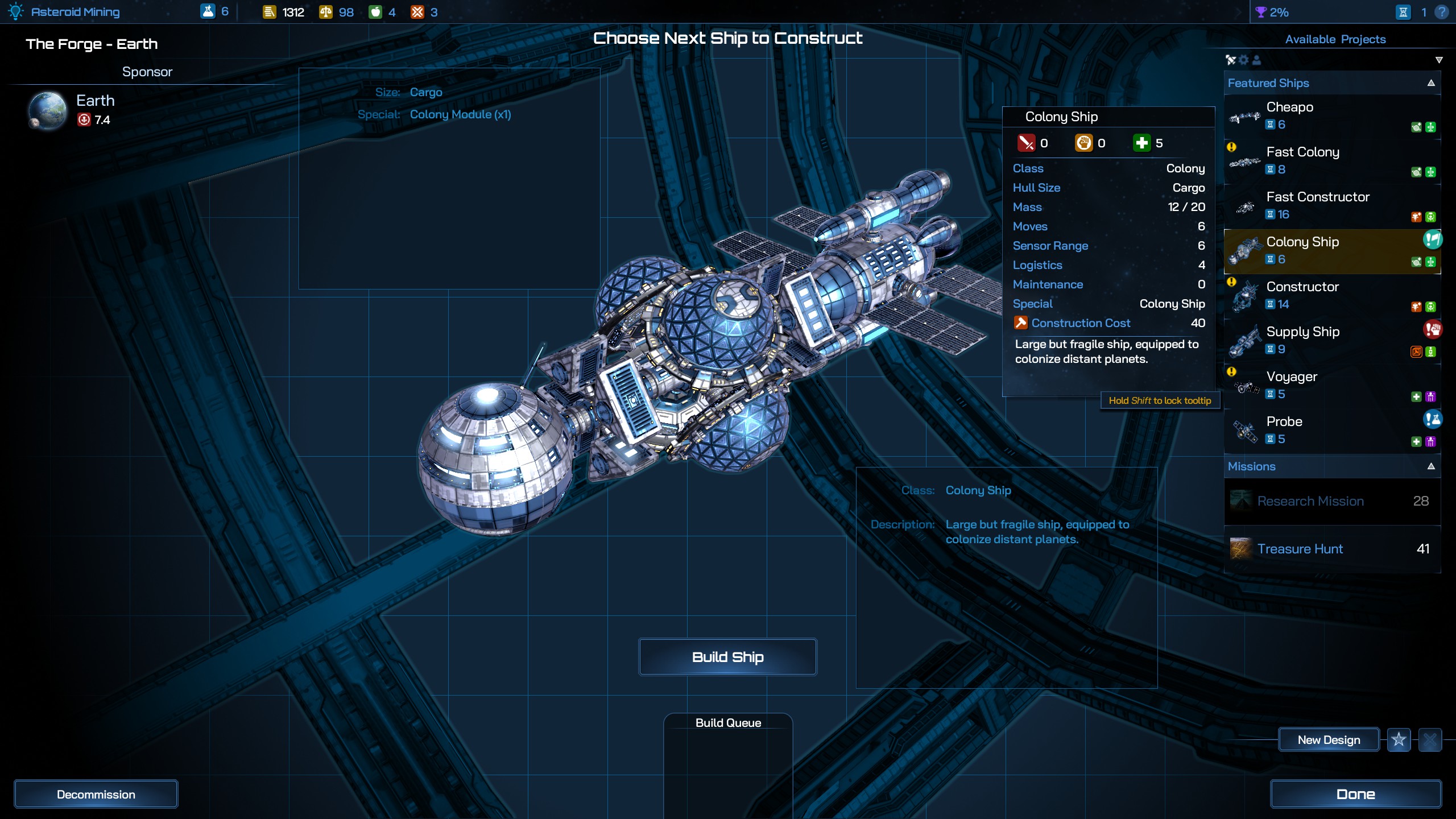
If you double-click on a shipyard, it will take you to the fancy shipyard screen. هنا, your priority should be to build a Colony Ship right away, especially if you intend to play a wide game with many planets. You might consider rush building it to expedite your expansion.
Your first Colony
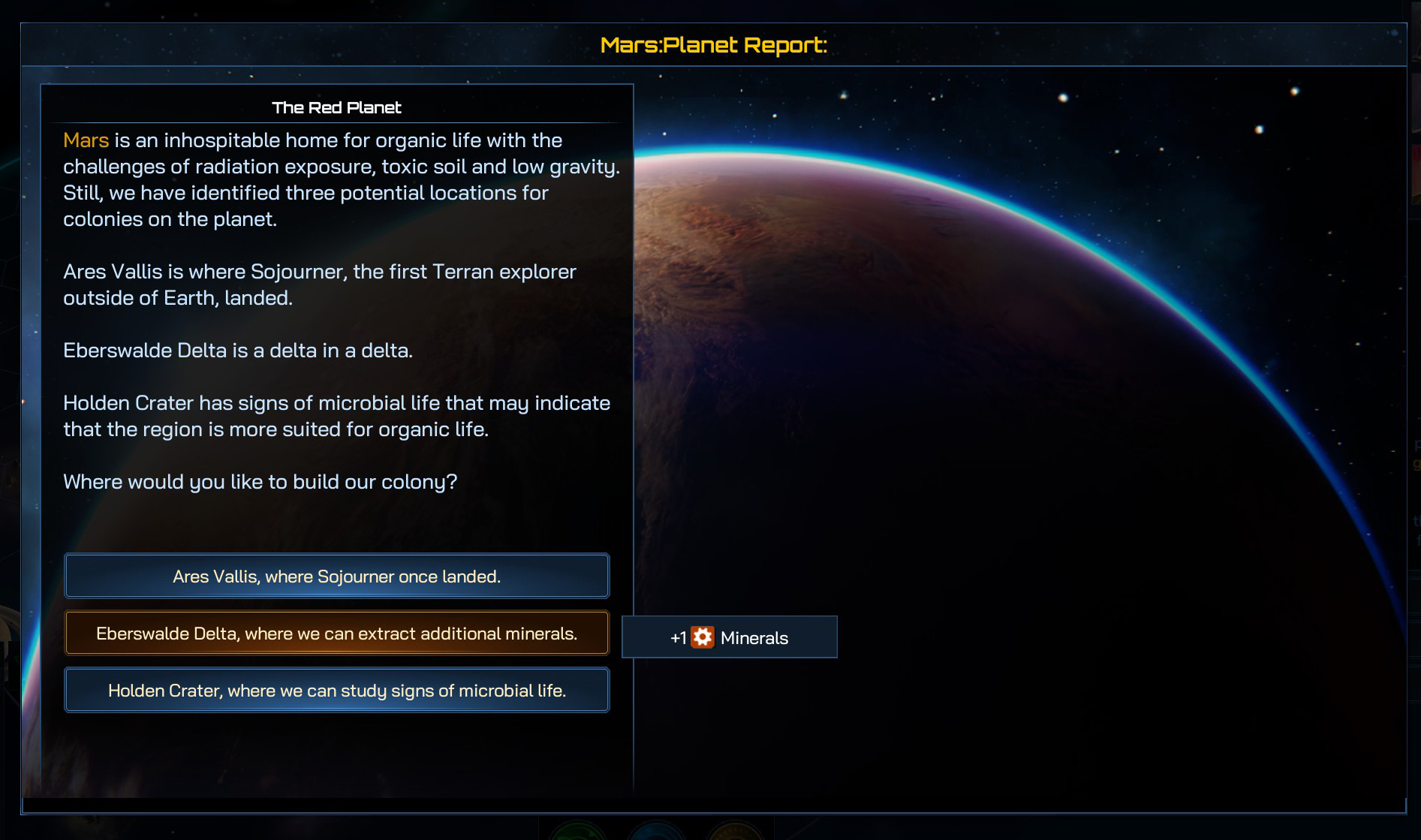
When you colonize a new world, you might encounter choices that can have consequences down the line. It’s essential to consider these choices carefully.
At this stage, Mars is merely a colony. Colonies contribute their outputs to their nearest core world, so they are valuable to have. Keep an eye on how much they are producing to make the most of their contributions.
Artifacts
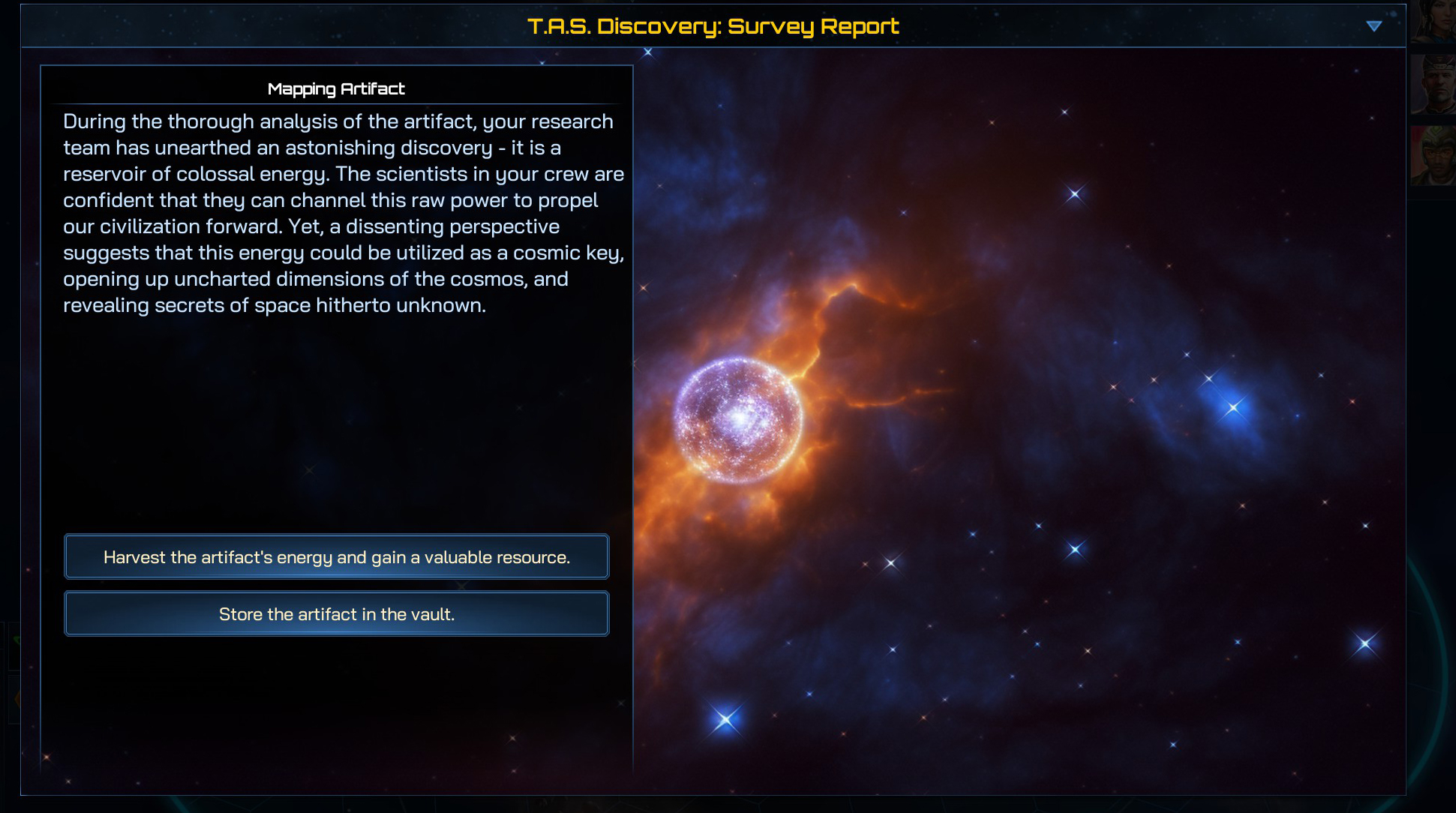
Your flagship will report back on things it discovers, and this might lead to some choices. على سبيل المثال, if it finds an artifact, you can decide whether to place it in your vault for later use.
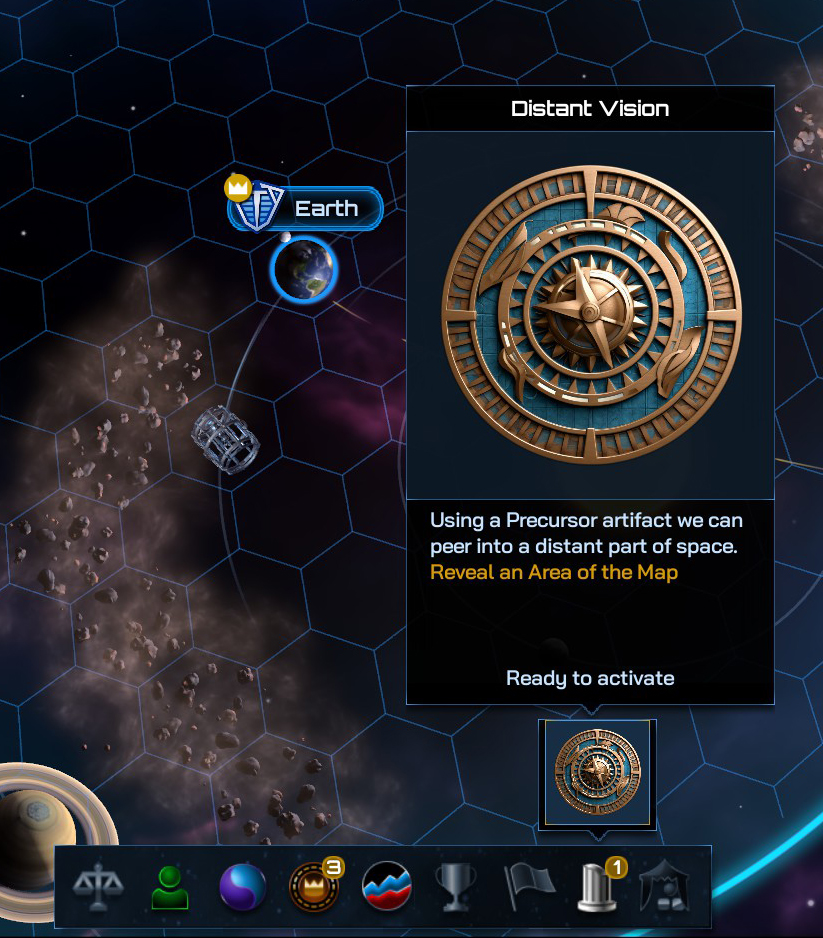
Artifacts can have various effects, such as revealing new planets in different star systems.
Expanding to other star systems
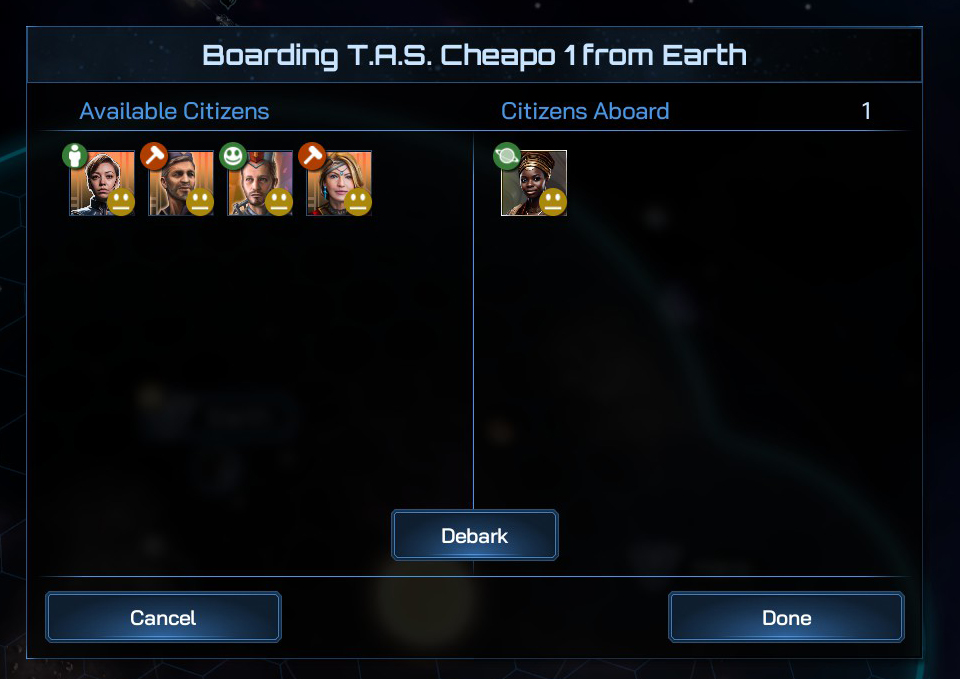
When it’s time to expand to another planet in a different star system, you’ll be asked to select a character for this mission. There are different strategies for choosing, but one common approach is to pick the least happy person who isn’t specialized.
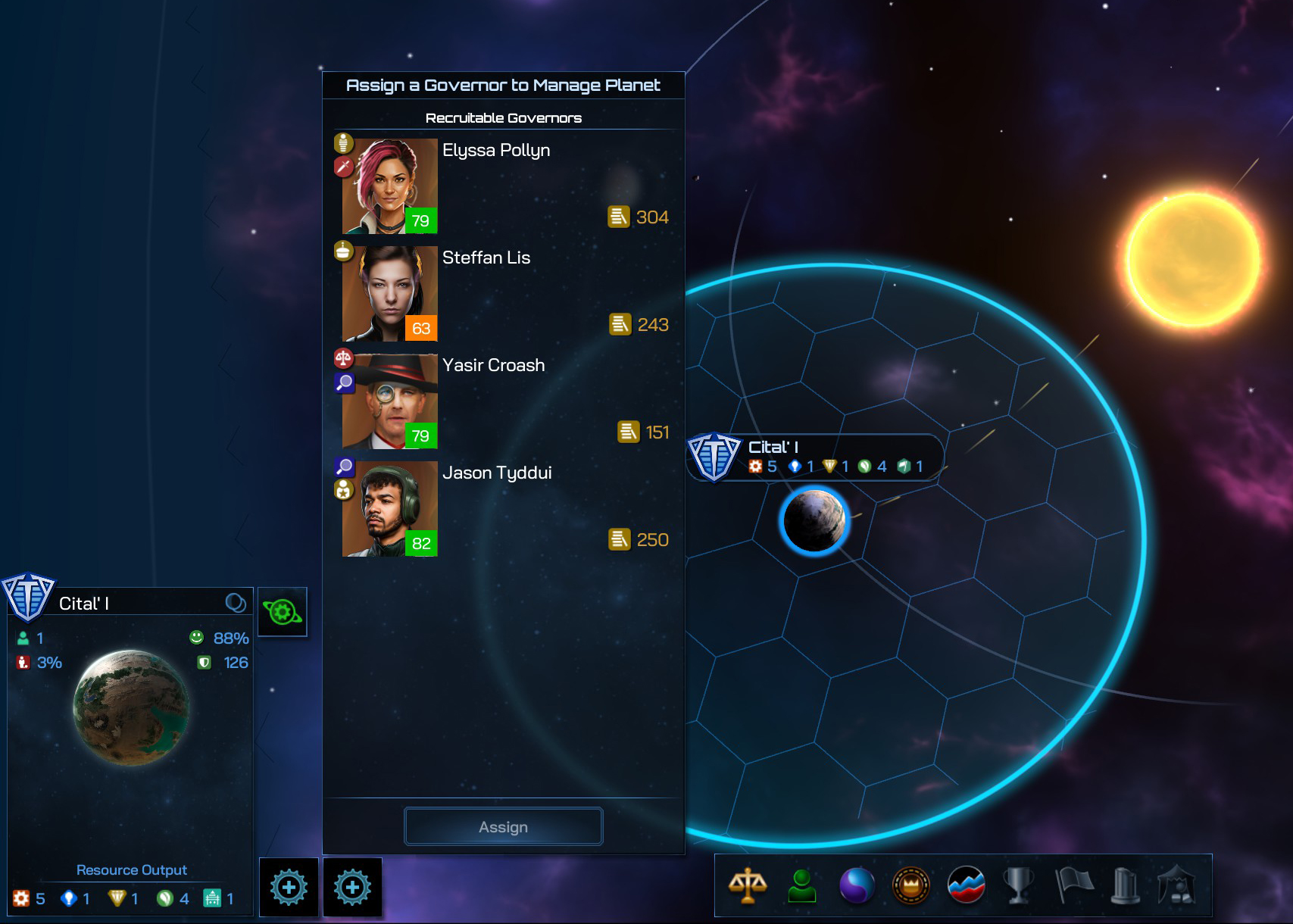
بالطبع, different players have their own methods. In some cases, it might make sense to select a character with high stats, especially if you plan for the planet to become a core world. You can do this by assigning a governor to the high-quality planet, and then you’ll be able to manage it directly, gathering resources from nearby colonies.
Aliens
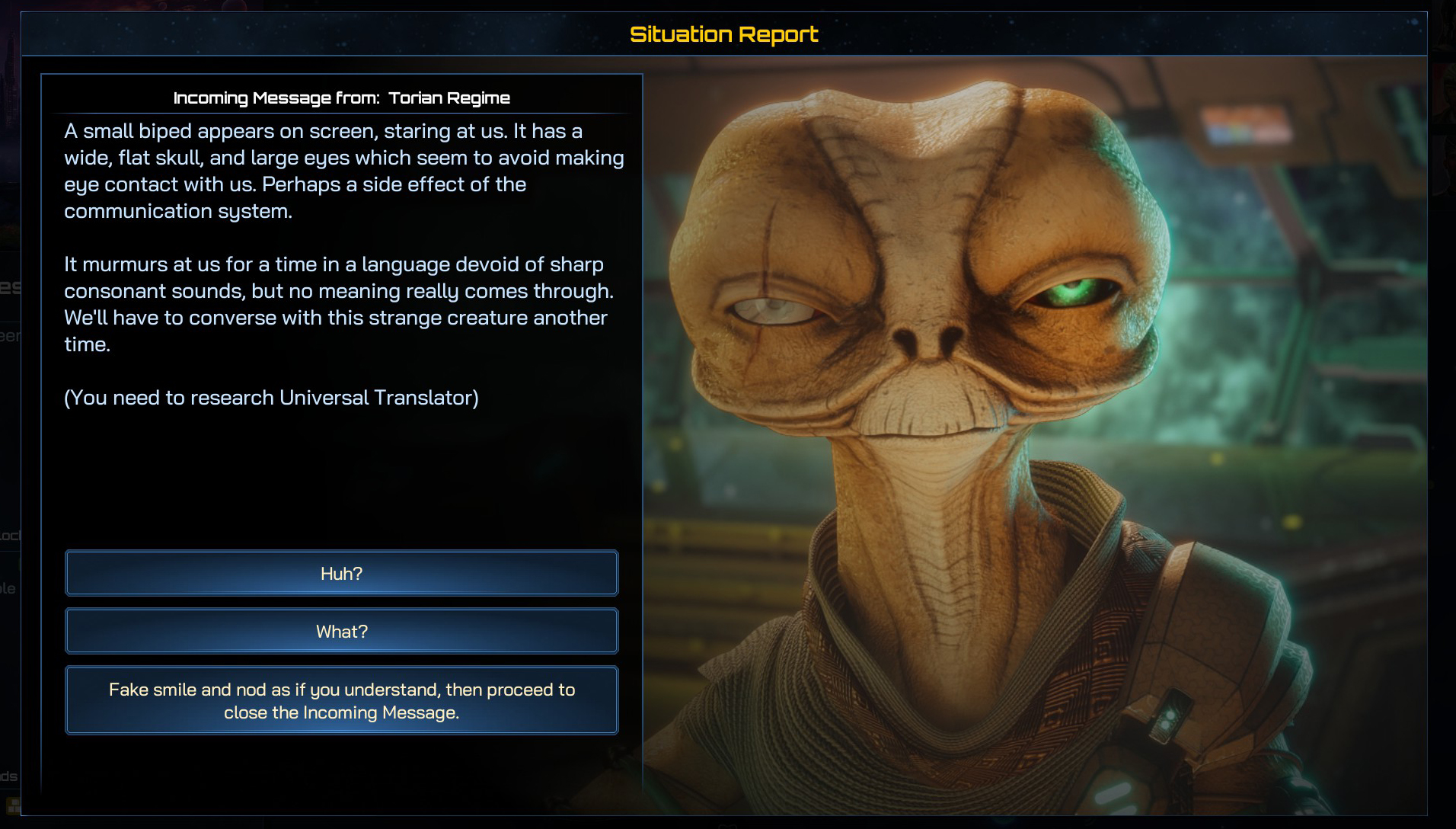
As your civilization expands, you’ll eventually encounter alien species. If neither of you has a Universal Translator (or if they don’t want to use theirs with you), you might encounter language barriers.
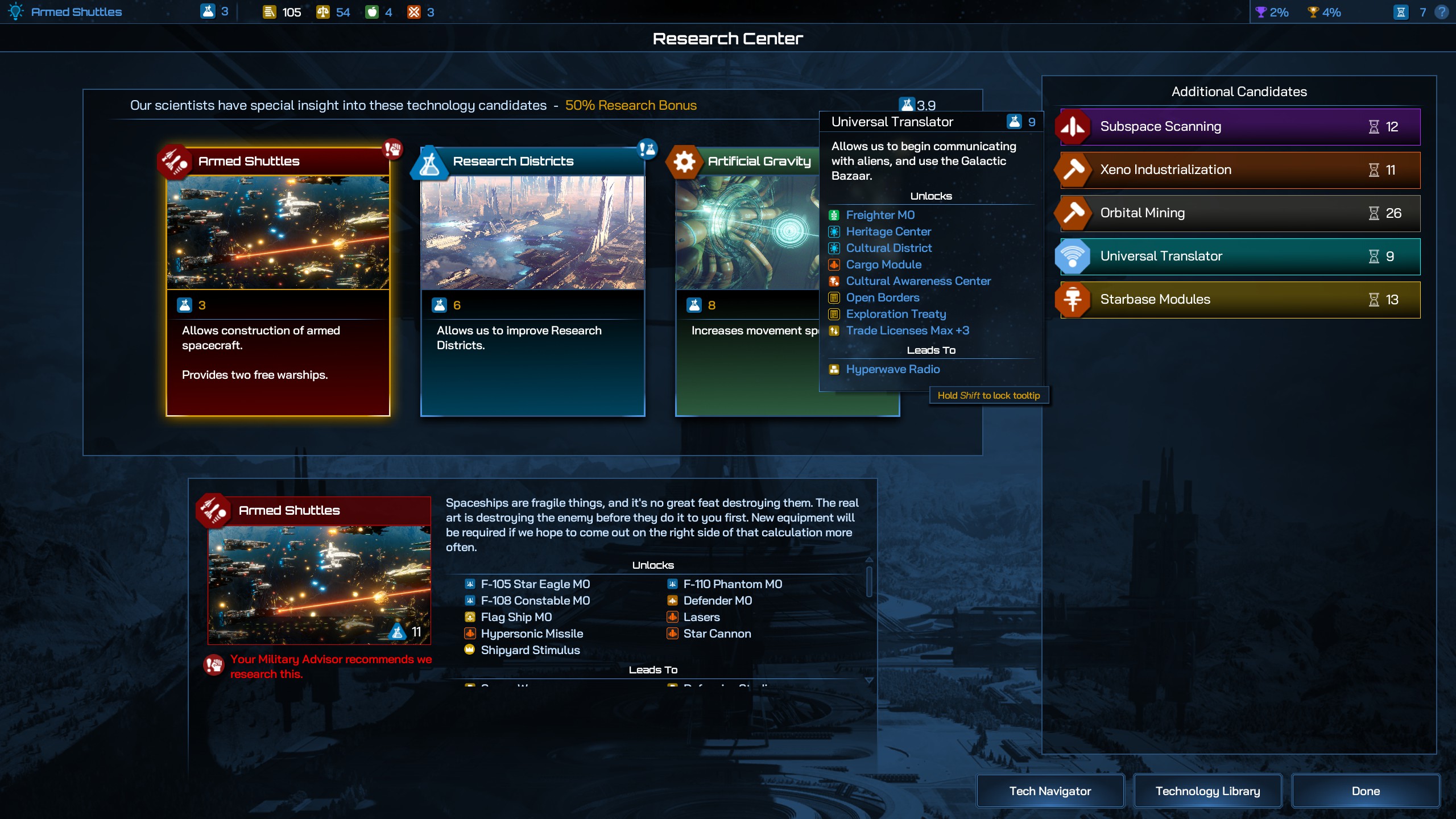
Researching the Universal Translator technology is crucial, as it unlocks the Galactic Bazaar and facilitates trade between civilizations.
Leaders
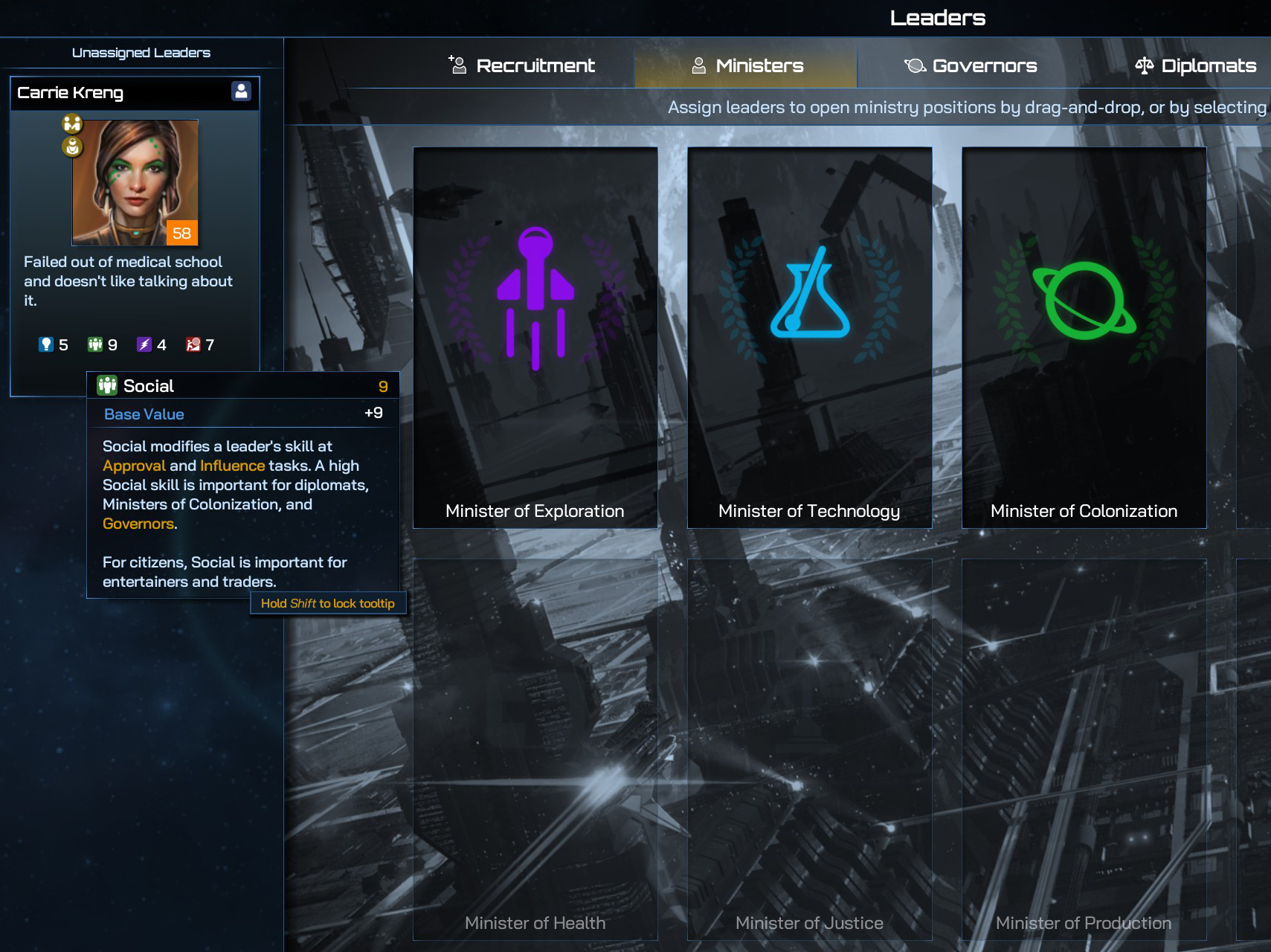
Leaders are citizens with a special trait, “leader,” that allows them to be utilized in various roles. Their stats can be used to provide buffs to your civilization. These stats are color-coded, making it easy to see which stat is relevant for each job. على سبيل المثال, selecting a Minister of Exploration can extend your ship’s range based on their Diligence stat.
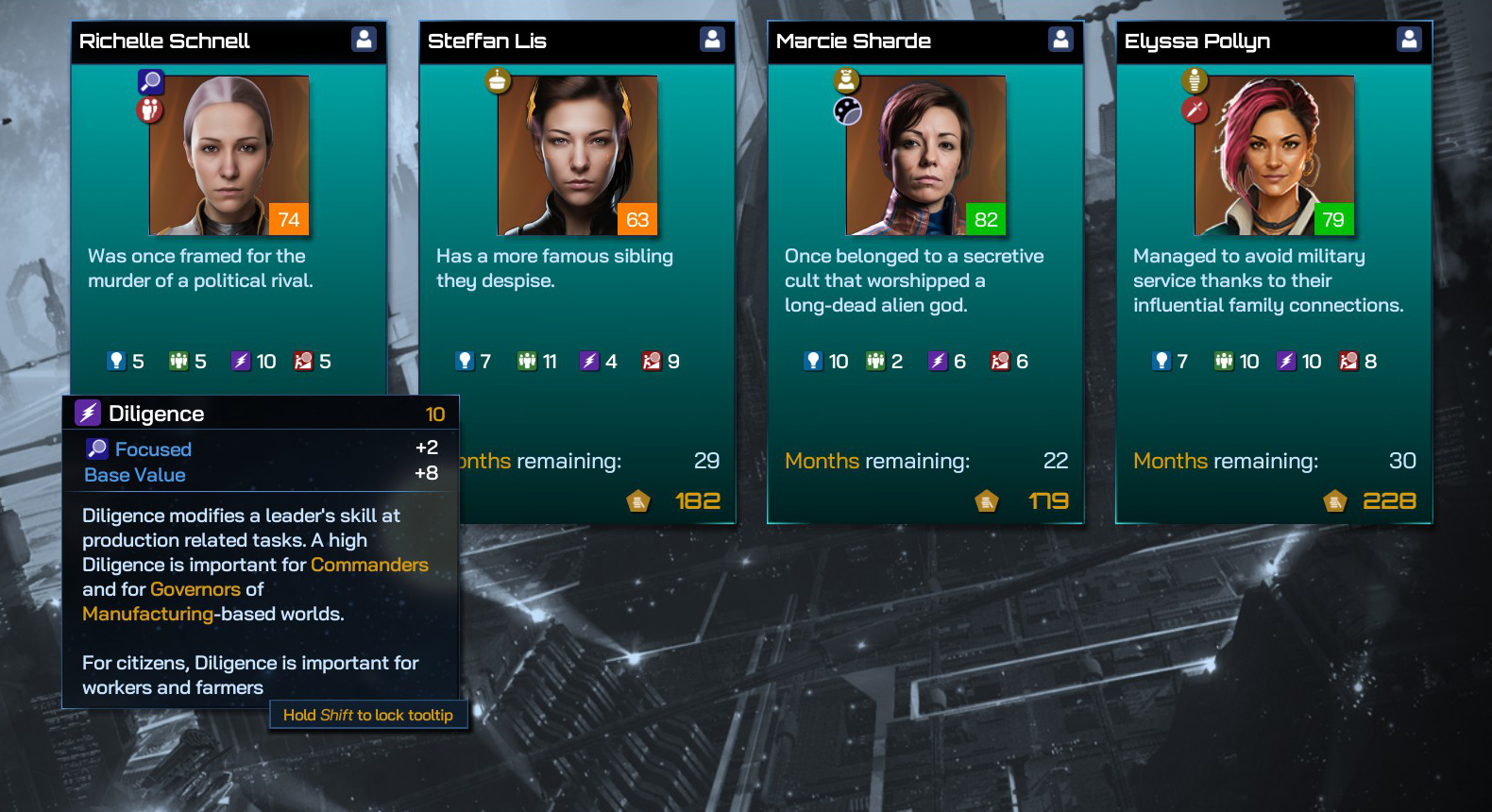
Leaders also come with backstories that can sometimes trigger events later in the game, leading to significant or minor consequences for the galaxy.
Orbitals
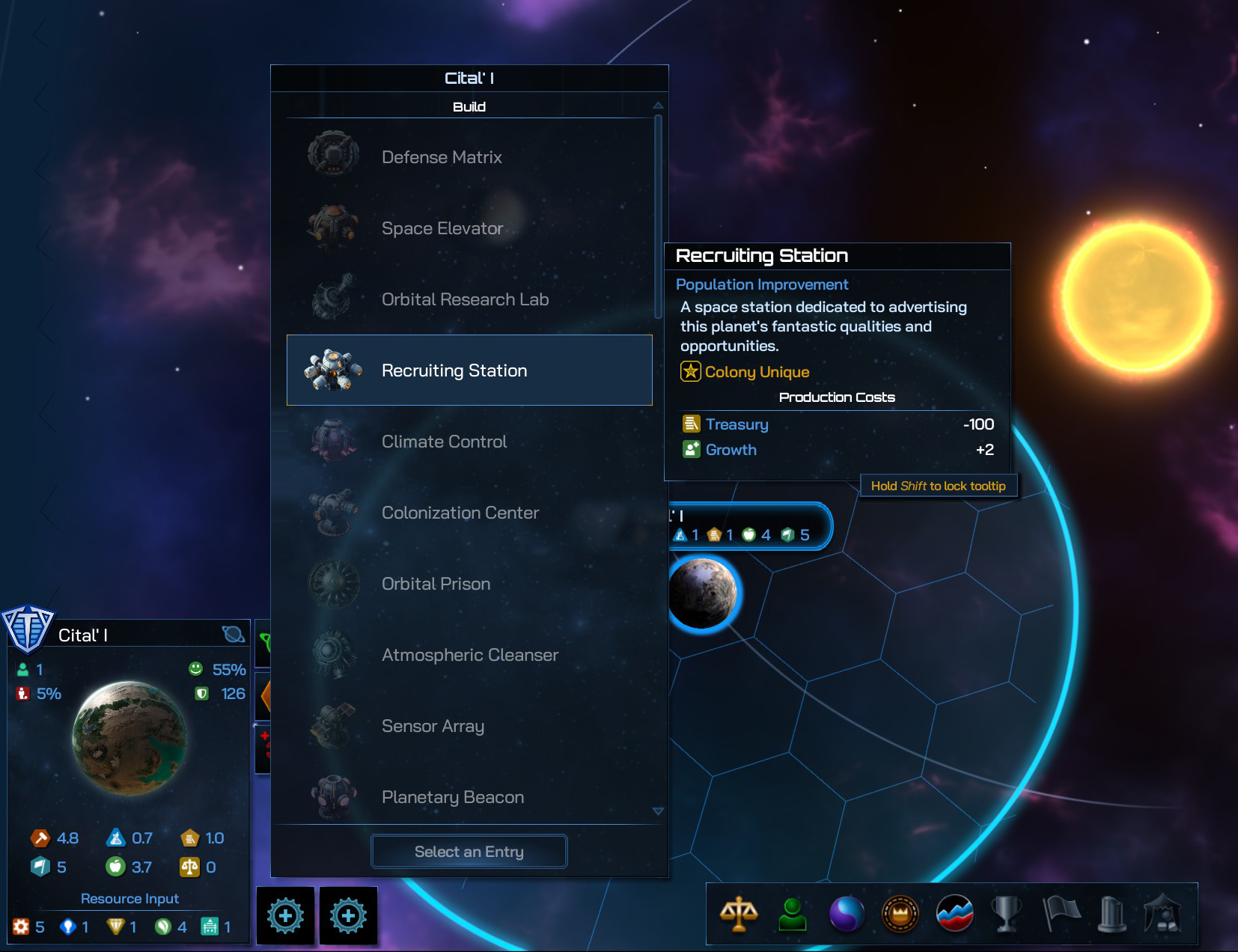
ال “Orbitals” button on planets allows you to choose objects to place in the orbit of your planet, providing various general benefits. Different types of planets have different numbers of orbital slots, so consider this when making your choices.
Getting Help
If you ever have more questions or need further assistance with Galactic Civilizations, there’s a very active Discord channel for the game where you can ask others for help and guidance. This should be enough to get you started. Best of luck with your galactic endeavors!
هذا كل ما نشاركه اليوم من أجل هذا Galactic Civilizations IV مرشد. تم إنشاء هذا الدليل وكتابته في الأصل بواسطة Frogboy. في حالة فشلنا في تحديث هذا الدليل, يمكنك العثور على آخر تحديث باتباع هذا وصلة.
